#I only wrote the bits directly after the > symbol
Explore tagged Tumblr posts
Text
Reading what @gayofthefae wrote about Mike never initiating anything in his relationship with El, I had a thought. I was gonna just reblog, but it turned into something much bigger than planned.
You're mostly right, but I think you're simplifying a bit.
I think you're right that El initiates everything, but it results in Mike feeling like it's his responsibility to be her boyfriend. And he does admire her, we know that from how he talks about her.
We don't really know if Mike invited her to the Snow Ball in season 2. That information isn't provided. We know enough that El was aware of it since Hopper specifically asked Owens about El leaving the cabin for one night. This tells us that El asked Hopper about it. Yeah, she knew about the Snow Ball because Mike told her in season 1. It can be assumed that the others told her about this year's Snow Ball. Did Mike ask her to go? That's just unknown. He certain didn't expect her there, though, judging by his surprise when she arrived.
I do think that Mike wasn't thinking of El romantically through season 2, though. That was all her. He just felt horrible about what happened to her and wished for her to come back safe. You can see when she leaves to go with Hopper to the Gate that he doesn't respond as she leans in to kiss him. Between that and El arriving at the Snow Ball, I think he gets the message that he's supposed to be with her.
Mike didn't get back together with her in season 3, no. Not from what we could see, at least. He makes some efforts to smooth things over with her, but they're pretty half-hearted. Even his "blank makes you crazy" thing seemed more about trying to say it without saying it.
However, we can't ignore that he did blurt out "I love her and can't lose her again!"
But I think this is more about his fear of losing her than anything else. They're talking about using her and her powers, and all he's thinking about is how he thought she died in season 1 and had to watch her go off to the Gate in season 2. He knows overuse of her powers is dangerous for her, and I think he blamed himself for how she overused them in season 1.
He's never able to utter those words again to her, even when she all but begs him to, and I think that's telling. She says it directly to him as she gets ready to leave Hawkins, and he just freezes and stands there. This goes back to how I don't think they were back together at this point. Just like when she left for the Gate in season 2, El staked her claim. They were together again. Mike was stuck again.
I think Mike was being honest with Will when he said that she would figure out she didn't need him anymore. To him, being her boyfriend has been about keeping her close. He thinks that's all he is to her, and she'd eventually decide he wasn't worthy of her. She's a sort of status symbol for him, but not to show off to others, just for himself.
I think there might be a bit of truth to the whole "if I said it, it would hurt more" thing. Mike has terrible self-esteem, but having a literal superhero as a girlfriend, knowing that she chose him, makes him feel worthwhile. He's afraid of losing that because, to him, it would mean that he's not worth anything, after all.
So, yeah, Mike doesn't initiate anything. He wants her to. That was the point of "blank makes you crazy." He was testing the waters. He wanted to see if she'd say it. She didn't. Not because she didn't feel it, necessarily, but because she had no idea what he was talking about.
However, when she finally does say it later, he realizes that it didn't make him feel like he thought it would. It felt wrong. But, by now, he was in too deep. She just lost her dad. So he goes along with it, now fearing for the end of their relationship and what that would mean. It was easy while they were apart. He didn't have to worry about anything.
But, once they were back together...ooh, boy. It was clear the whole thing was a shitshow. Not only was he weird with El, but also with Will. It's important to remind people that Mike had seemingly made things right with Will before the Byers moved. We saw that he was back to being his nerdy self in Hawkins, playing D&D again even though he acted too cool for it in season 3. It's because El was gone. She never had an interest in his nerdy interests, so he pretended he didn't like it. He always tried to change himself around her to seem more "worthy."
Going to visit them in California, though, we see Mike is changed again. He's dressing differently. He seems to be trying to be trendier, which is called out by Argyle when he says its not Ocean Pacific, but "a shitty knockoff." It's not who he is. He's putting on a performance, just as he did in season 3. He plays the part of boyfriend, but can't manage it when it matters most. Just look at how callous he seems when El gets bullied. It's because she doesn't act like how he thinks a superhero would, and she even calls him out on it when she says he thinks she's a monster.
Mike is more genuine again after El leaves. He starts opening up to Will more, once again making things right with him. He's no longer playing a role. He's just Mike again. He tries to talk to Will about the problems he's having, and Will, the selfless little dummy, keeps reassuring Mike that they'll get back together because he assumes that's what they both want. However, Mike seems to resonate with Will's words when Will says that it can be hard to be honest with those important to you because they may not like the truth. The truth being "I'm sorry, but I don't love you like that, but having you choose me as your boyfriend is the only reason I think I'm worth anything."
Both Mike and El seem like they're on their way to being more honest with each other. El is realizing that seeing herself as a superhero is not a mature way to think. She left to become the superhero Mike wants her to be, but she learned that it wasn't what was best for her. She needed to accept herself and be her own person. Mike started to see that hiding the truth wasn't helping anyone. Unfortunately, Will's attempt to reassure Mike led to him pretending his feelings for Mike were hers. In his mind, if he sees Mike that way, then El must, too. Why wouldn't she? It's Mike.
However, El stops initiating. They share a forehead touch on their reunion, but that's it. She quickly notices Will, and, with Mike's help, goes to embrace him. We see no real conversation between them until the pizza place, where they share a rare genuine (and, curiously, not especially romantic) cute moment before El gets a solemn look on her face. She takes Mike's hands and makes him take the sensory deprivation glasses off to look at her. She's initiating something now, but it doesn't seem like it's gonna be happy and romantic. Unfortunately, Argyle took Jonathan's master class in "Interrupting Important Moments" and chose that moment to bring them some pizza. We can argue later about whether or not there's symbolism in Argyle and El forcing Mike to try something he wrote off as disgusting, only for him to concede he likes it.
Mike wouldn't have been able to do anything in the pizza place without Will. He was at a loss. Even after all that happened, and with El's life on the line, he's still hesitating. Selfless dummy Will just made things worse because he didn't realize it was a lie, so he pushes Mike to "be the heart." Mike's fear of losing El combined with Will's reminder of how El "always will" need her pushes him to say what he previously couldn't. Will is basically holding this ship together like in Spiderman Homecoming. Yet, we don't see Mike and El be remotely romantic afterwards. The most we see is El leaning on Mike in the hospital. She all but ignores him in the cabin later. You'd think that after what happened to Max she'd need his support.
I still can't understand why people think that monologue was romantic. I guess they haven't thought about what built up to it.
140 notes
·
View notes
Text
Last year, I wrote an essay discussing how the Law of Cycles could be considered an Uwasa (Rumor) by Magia Record lore logic, but it wasn't until my rewatch of the MR anime that I realized the same could also be said of Walpurgisnacht. We literally have a Rumor introducing her into the narrative at the end of S2x05, "I Won't Forgive Anyone"!
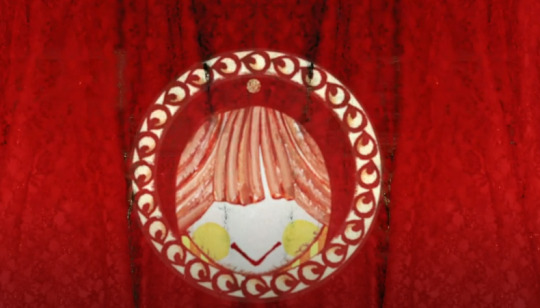
"Did you see it? Did you see her? The greatest, most terrible, the most powerful Witch of them all? If summoned by the power of the Uwasa, she would turn the land to ash and the skies to empty void, and civilization would cease to exist. That's what everyone in the Wings of Magius says! All hope will die on this day, and on this day a new hope will be born. Despair itself was created for this witch. For magical girls to change their fate!"
This "Rumor of Walpurgisnacht" not only succinctly introduces Walpurgisnacht to the narrative, it also provides an additional reason why Walpurgisnacht is coming to Kamihama in this iteration beyond the witch-luring macguffin the Wings of Magius are using to draw them in. In this sense, this Rumor is an MR-only addition that doesn't exist in the context of the original series.
For those not familiar with Magia Record, Rumors/Uwasa are witch-like entities created by Nemu Hiiragi's unique magic which obey certain rules in order to function. In that sense, Walpurgisnacht is definitely not an Uwasa sensu stricto, as her existence predates Nemu's.
However, just like the Law of Cycles--a promised savior which magical girls know about via rumors--Walpurgisnacht is also known through rumors well before she arrives in the narrative. In the original anime, Mami already knows this witch coming in the first timeline, and Touka and Nemu already know about her in this particular MR timeline as well. Stories about a massively destructive witch have been passed down from magical girl to magical girl over time... just like knowledge of the Uwasa are "transmitted" in Magia Record and just like the Law of Cycles at the end of the original anime.
In addition to setting up yet another parallel between Walpurgisnacht and the Law of Cycles, this would also explain why Walpurgisnacht does not appear to drop a grief seed when defeated by Madoka in earlier timelines (which leads directly to Homura being forced to kill her in a particularly traumatic iteration). (There is a grief seed in the PSP game, which is pre-Rebellion/Magia Record, but we'll see if that particular detail ends up being retconned out in Walpurgis no Kaiten.) Walpurgisnacht as an Uwasa-like being would explain why she acts and appears differently from other witches, despite ostensibly being a witch herself.
One other interesting thing about Uwasa is that they have the ability to "possess" magical girls--as seen with Tsuruno and Mami in Magia Record, and arguably Madoka in Rebellion. It is possible to forcibly separate the two after fusing, but only if the person attempting it truly understands the heart of the one who is possessed. It's easy to see how this could potentially be a key plot point in Walpurgis no Kaiten, with a tidy bit of symmetry--just as Homura wrested Madoka from the Law of Cycles, perhaps Madoka will return the favor in the future.
Rebellion also has other instances of proto-MR mechanics, such as Mami's use of Connect magic in her joint "Tiro Duet" attack with Madoka. It's not impossible there will be other carryovers from MR in Walpurgis no Kaiten, especially since Inu Curry was heavily involved in all three productions and has been extremely consistent with their symbolism thus far. This is just a tentative theory at the moment, but file this one under the "I am watching closely" tab.
62 notes
·
View notes
Text
The Archetypes of Red Rose, White Rose
I need to balance my brain out due to sudden onset of depression. It is the result. Rommel is probably the only general who, even if you draw him from the back, he's still recognizable- flowers, a camera, and love for beauty. Rommel has a Venus-Mercury conjunct with a direct Neptune influence; he is going to appreciate artistic expressions.
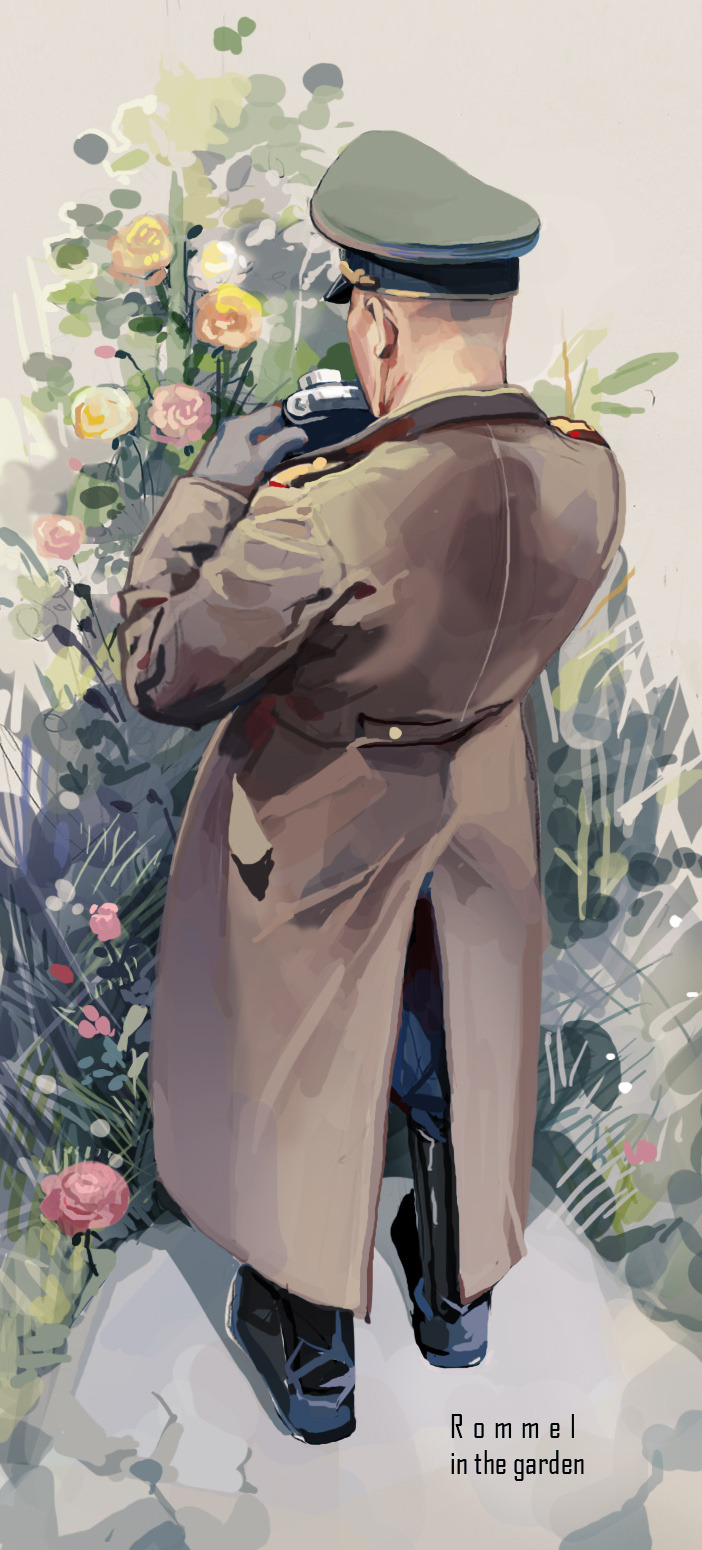

In fact, this colored-doodle with an unintentional Mucha vibe has the energy of his wife Lucy in mind. According to some sources, Rommel wrote home to Lucy daily, as it was reported to be his mental crutch- I imagine it to be transcendental emotional support, not unlike my own experience, my own relationship with our Tumblr community here. Whether you guys interact with me directly or not, you keep me alive. My sincere thanks to you.
Lucy was a formal dancer in Danzig with a decent middle-class background, her father seemed to be a land owner- Lucy being able to do art, probably added to his admiration for her- fellow artists, angelic companionship.
I suppose he did need emotional supports, and a lot of it-- Rommel is the only high commander with whom Kessering "the smiling Albert" did not get along-- which is a feat. After all, Kessering was very renowned for his exceedingly cordial and diplomatic temperament. The same could be said of von Rundstedt, the calm, gentlemanly, old Prussian field marshal. These two could put up with some bad BS from any one else, except Rommel. He was too intense, too mentally off-balance, too difficult to deal with for his colleagues.

There are a few things I noticed from Rommel's biography (including the Trail of the Fox, 2005), that allow me to make some observations. His love for Lucy appears to be non-sexual. They had their only son 12 years after marriage. That is a pretty long time, not customary with a Scorpio man who has a 8th house Mars (who is supposed to have at least above average sex drive).
As a matter of fact, Rommel had a daughter with Walburga Stemmer before his marriage with Lucy was finalized. At that point Rommel’s family felt the need to step in and strong-armed him back with his fiancée-- one reason being to prevent the young lieutenant from the pitfalls of sex and alcohol. In my humble opinion, the subtext here might be Lucy would not lead him astray in that regard, therefore his conservative family would rather have him marrying Lucy.
A side note, Stemmer family still holds a collection of hopelessly romantic letters from Rommel. Did Rommel write comparable letters to Lucy at that point in time? A bit hard to tell.

I could not recall which article comments that Rommel was "hen-pecked' in the household, but Lucy was dominant at home, that part had been very true.
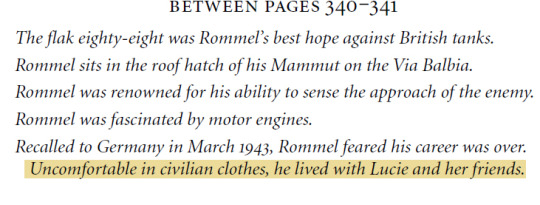
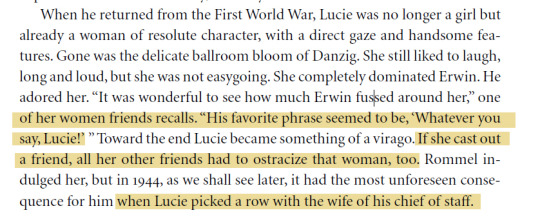
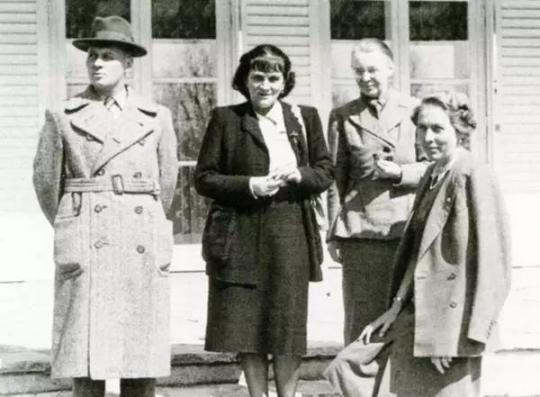
Ouch, I don't know, some aspects of this living environment must've been toxic to Rommel no matter how much some folks wants to romanticize it. It is horrible to be in a friend group where there's a mean girl boss who takes pride in ruling over her husband and turning any girl who crosses her into a persona-non-grata. But I digress. Back to my title.
Nevertheless, for me, Lucy being archetypal White Rose still holds water as a concept.
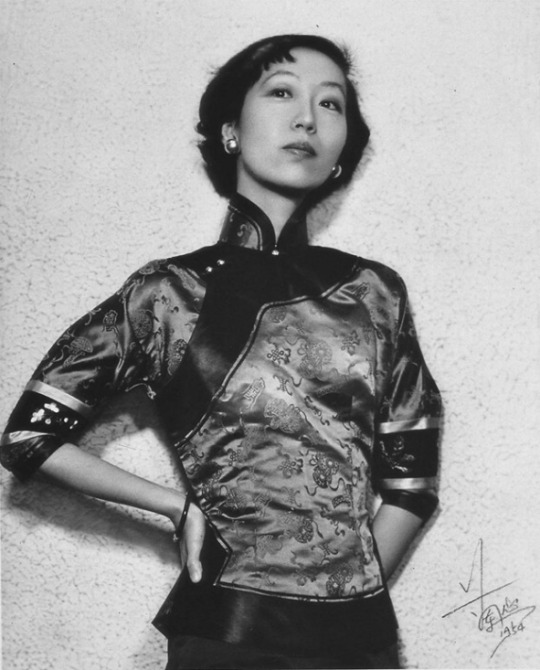
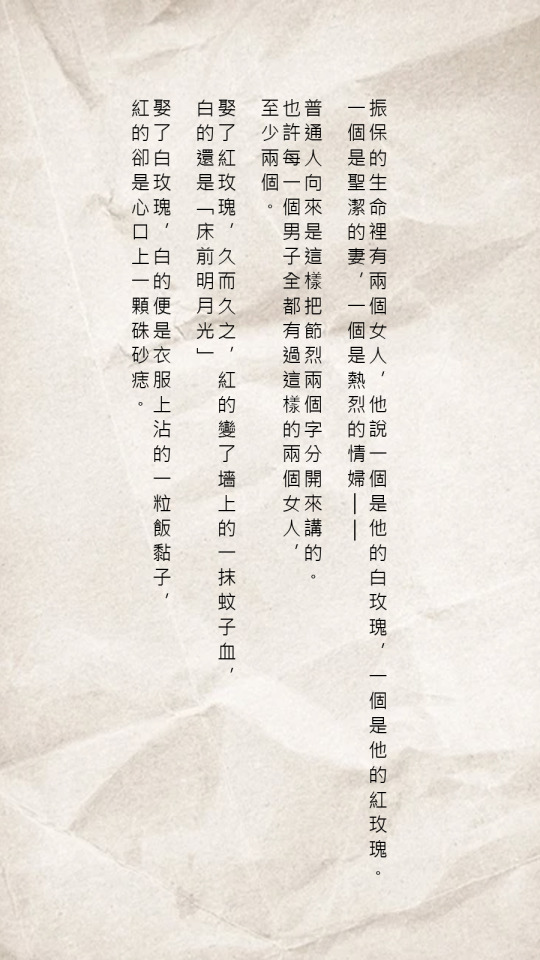
The Red Rose- White Rose archetypes originated from the same-titled short novel by Zhang Ailing, one of the 20th century's greatest female writers. She depicts love's tragedies as Chin dynasty fell apart and China marched into an era of post-colonialism, world war II, civil wars and partisan conflicts-- and eventually, modernity.
White rose is your ideal wife, the guardian of your family's social standing. She is angelic, she seems docile, she reminds you that you are from a place of honor and integrity, not of seedy backgrounds and carnal desires. White rose kills love by loving you, by being stable, by calming you down whenever you freak out. Very slowly, she castrates you, she brings you home to domesticate you.
The Red Rose symbolizes those dark desires, a black hole that sucks you in to have sex with you, a fragrant bed, a sex dungeon you do not have the will power to claw yourself out of. Red rose loves you by conquering you, destroying you and everything you represent and cherish with triumphant strides. Very quickly Red rose tears you down, burns all your bridges, until you are beyond recognition, until you are flesh, blood, fire and desire, a literal mess.

It is implied in Ailing's novel that men invariably choose the White Rose, because they are human, all too human. Marrying her, he regrets it; not marrying her, he regrets it even more. Such is love's tragedy in the face of humanity, and tragedy is the only inevitability in Ailing's universe. That's why I pull Lucy in as a faint through-line in my Montgomery x Rommel fanfics... not that I am going to write any more, I don't think so.
And yes, Red Rose is synonymous with Bernard Montgomery, in my fandom brain's humble opinion.
I know I am weird.
50 notes
·
View notes
Note
Hello again! I was the anon that asked what interactions you would like to see with Alhaitham and Kaveh (and I am the reader that made the two listed comments). Thank you for the thoughtful response. It's so interesting to hear your perspective of these two. I hope you had a nice vacation. My one takeaway from Cyno story quest act II is that Cyrus was acquainted with the Sumeru crew's parents. He was shown in the photo from Kaveh's handout standing behind Alhaitham's father. I don't imagine they were close or anything, but it does make me intrigued. I wonder if they would explore more of that group in the future, given how they relate (literally and in parallels) with the Sumeru crew.
Hiya! I’ve finally managed to find time to dedicate to this ask, it’s scratched the itch in my brain! I, apparently, have quite a few thoughts about this topic so thank you for asking! Also !!! Thank you for previous asks AND the listed comments on my fic??? I truly appreciate the time you must have spent :,D <3333
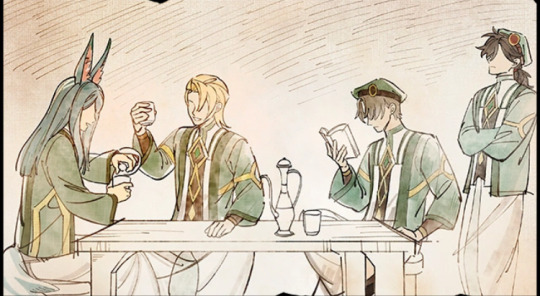
This!! The specific detail of Cyrus canonically being mentioned to personally have met, not only Kaveh’s father and mother and tighnari’s parents, but ALSO alhaitham’s parents drives me insane because of how it is directly unmentioned.
It’s uncertain as to the extent of Cyno’s actual relationship with kaveh’s or alhaitham’s parents, but based on what Kaveh’s mother wrote, she, personally, didn’t seem to be close with cyrus, as she records their meeting to be the first instance in which she has met all the attendees. She records that her and her husband were invited to a gathering, but she knew none of those in attendance, only that her husband seemed to be friends with “the man with long ears” - being tighnari’s father. nothing is said about kaveh’s father knowing the other people in attendance, but as it isn’t specified, it also isn’t impossible? faranak does write that it’s unlikely they’ll see any of the people in attendance again after the gathering - but i imagine that tighnari’s father here is an exception, given that he and kaveh’s father are recorded to be friends (also, the only inkling i have for the 'talkative woman' is potentially madam faruzan? but as this is so vague i'm not too sure about speculating)
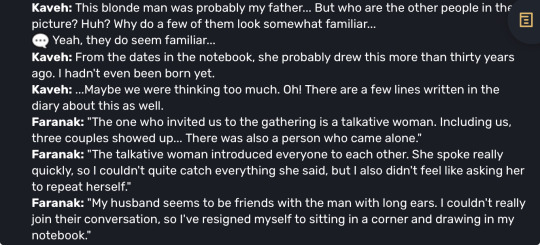

kaveh’s mother having canonically met alhaitham’s parents drives me a little bit !??!!?? because kaveh notes that the figures in the drawing seem familiar, which, of course, doesn’t mean he has identified alhaitham’s parents, especially after he disregards any potential connection with “maybe we were thinking too much.” but given tighnari’s father being a fennec it is rather odd(?) that he doesn’t make a more personal connection, at least to tighnari's father being the "friend" to his father that his mother writes about
however, in terms of what the narrative is trying to achieve in kaveh's hangout, it does make sense that these dots aren’t connected. the point here isn’t that kaveh recognises these figures, but rather that he relates the companionship in the drawing to those around him. kaveh’s hangout is very much symbolic, being that each figure in faranak’s drawing is meant to represent kaveh’s friendship group, meaning he should rely on his friends, tighnari, cyno, and alhaitham - as the quest is entitled “companionship, the sole antidote”
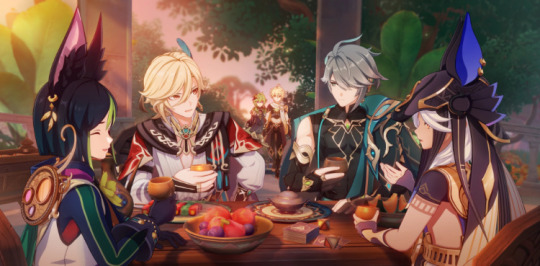
the fact kaveh DOESN’T identify cyrus in the picture leaves room for development, or future mention of this. Cyrus canonically talks to zaha hadi, kaveh’s mother’s lecturer, about kaveh, and zaha hadi is the person whom kaveh turns to in order to learn about his mother when she was younger.


There’s definitely potential to draw upon here - if cyrus knows he has met kaveh’s parents in the past, and he and kaveh have a personal rapport due to kaveh’s friendships with cyno and tighnari, it seems strange that he omits this detail? Especially, if it’s considered canon that kaveh’s hangout has taken place in-game, then cyrus, given that zaha hadi mentions kaveh to him, might be aware that kaveh has been asking about his mother?
(A counter to this would be that due to cyrus’s potential limited encounter with both kaveh’s father and mother, and that it took place over thirty years ago, he has no basis to open this dialogue with kaveh, as it may be a sore spot (This could also apply with cyrus having met alhaitham’s parents - perhaps he simply only met them once, but still, i crave alhaitham parent crumbs) - however, in an ideal world, this could be some sort of catalyst or feed into the idea of kaveh potentially reaching out to his mother in future events, perhaps with cyrus referencing this past gathering(?)
Now, moving onto tighnari’s parents, who are very much alive and well, and also have canonically met kaveh’s parents - with tighnari’s father being directly stated to be close with kaveh’s father, in terms of the gathering at least. with tighnari and kaveh being friends due to exchanging letters during the construction of the palace of alcazarzaray, rather than tighnari’s parents’ influence, could indicate that kaveh’s mother dropped all contact with any friends or acquaintances, which i think likely. however, i am !??!!?? very confused about this implication
tighnari’s parents would, of course, know that kaveh is tighnari’s close friend, and i presume that kaveh has met tighnari’s parents at some point, so from this, i would imagine that tighnari’s parents having known/met kaveh’s parents may have come up at some point? Especially with tighnari’s father being recorded as being friends with kaveh’s father, at least from faranak’s perspective?
in terms of the canon, however, this appears to not be the case, so i would LOVE for this to be mentioned at some point!! Especially as sumeru cast heavily revolves around family, found and biological (i’m looking at you cyno’s second story quest)
In terms of alhaitham’s parents, the only mentions of them are in alhaitham’s character stories and here in kaveh’s hangout. there’s no indicator as to whether alhaitham’s parents were close or just acquaintances with cyrus, kaveh’s father, or tighnari’s parents, but in my mind i think it’s interesting that his character stories record his grandmother teaching him of his parents, and his retaining part of his parents’ book collection when his grandmother passes. basically i think alhaitham treasures what he does know of his parents, and i think a lil mention of them by people we KNOW met them, if only for one gathering, would be appreciated
So this links directly to kaveh’s mother - if she is ever mentioned in the future, it would be INSANE wish fulfilment if her drawing was returned to, and the figures were identified, and memories from those present and alive could be shared
(I also think it’s so funny that her son is roommates/innately bound by mirror symbolism/married to the son of the people she thought were uncomfortable and awkward. basically i am in DIRE need of a kaveh and faranak reunion and for them to sort their issues, obviously for kaveh’s development and reconciliation within himself, but also for a faranak-alhaitham interaction…. Can you imagine. Now i have thoughts about that, but this has gotten off topic!!!)
Of course, i’m aware that i’m overthinking a lot of this, and this could be one of the many plot discrepancies within genshin, and that as a result of creating symbolism, in-game implications were created that weren’t supposed to be touched upon, but i think a lot of fun comes with discussing and hypothesising (manifesting) these things!!
Thank you so much for your ask!! Delving back into this part of kaveh’s hangout is always a treat, so i hope you enjoy reading my brainrot :,)
#haikaveh#kavetham#alhaitham#kaveh#genshin impact#haikaveh meta#this was actually so fun to write my mind is going BERSERK at all these possibilities#im also !?!?!? TIGHNARIS PARENTS ARE ALIVE AND WELL everyone is always an orphan so this jumpscares me#we met naphis after so much name dropping of tighnari's master... tighnari parents reveal WHEN#also sumeru's thing really is FAMILY huh like cyno's second story quest makes me sick#also!! i had an amazing vacation thank you!!! :D#thank you for your patience in me answering you <3333
34 notes
·
View notes
Text
quick breakdown of what i think The Legend (as told to us by ralsei) might be communicating, since i don't think i've actually laid out my thoughts on this before
Once upon a time, a LEGEND was whispered among shadows. It was a LEGEND of HOPE. It was a LEGEND of DREAMS. It was a LEGEND of LIGHT. It was a LEGEND of DARK. This is the legend of DELTA RUNE
this first section is just serving to establish broad themes and symbols relevant to the story. it's scene-setting, and suggests an origin for the legend ("whispered among shadows").
For millenia, LIGHT and DARK have lived in balance, Bringing peace to the WORLD. But if this harmony were to shatter... a terrible calamity would occur. The sky will run black with terror And the land will crack with fear. Then, her heart pounding... The EARTH will draw her final breath.
we know as of chapter 2 that this part describes the Roaring, and vaguely gestures at its cause (the "harmony" between light and dark being "shattered"). in a normal RPG "prophecy," this would be describing the Terrible Outcome that the heroes are destined to prevent.
the part that confounds theorists is how it seems to contradict the next bit, which more or less directly states that the three heroes of legend won't even arrive until after the Earth has died. what this implies is that the Roaring already happened before the game even started. if we're doomed from the start, then what's the point?
if we say that this is a "second take" of the world, then this is actually internally consistent. the Roaring did, in fact, already happen in a different "session" or instance of deltarune's story -- maybe it happened in this timeline, and the timeline was recently reset, or maybe it was a different timeline from which this one was spun off. either way, the world was given a second chance to stop the Roaring, but this only became possible after it had already happened (at least) once.
if we put stock in the idea that gaster wrote the Legend (as it's told by ralsei), we could speculate that this part of the Legend isn't actually prophetic, but rather based on some kind of prior experience, whether because he saw it from the outside or experienced it first-hand.
Only then, shining with hope... Three HEROES appear at WORLDS' edge. A HUMAN, A MONSTER, And a PRINCE FROM THE DARK. Only they can seal the fountains And banish the ANGEL'S HEAVEN. Only then will balance be restored, And the WORLD saved from destruction.
this is, of course, setting the scene for our current "session" and laying out the basic goals for the rest of our journey (or at least, what those goals are *supposed* to be).
under the "take 2" interpretation, this is the section describing the world's second chance. the Roaring is fated to happen, and indeed already has, in a different "session." without intervention, the Roaring WILL happen, by default. so the Legend hasn't simply tasked the heroes with preventing a calamity that theoretically COULD occur, but rather with changing the very fate of a world that is supposed to be DESTINED for that calamity.
"Angel's Heaven" could be referring to some end-state of a Roaring'd world, but it might refer to something else, depending on who or what we think this "Angel" actually is. if we consider the Angel some kind of demiurge, creator figure, or even author stand-in, then "heaven" could even refer to the story itself, whereby the narrative described in the previous section -- the one that prescribes a "fated" Bad End -- might itself be the Angel's "Heaven." it's a world of the Angel's design, that follows Its will; "heaven" in this sense might not refer to the specific quality of someone's Happy or Good Place, but more generally to the Angel's holy domain -- Its sphere of control, or maybe Its sandbox. to prevent the Roaring and change the story's ending is, in a way, to "banish" that story and replace it with a story that the Angel didn't design and can't control -- a story of profane (or perhaps "hellish") origin, which happens to be consistent with gaster's roles as both Actual Satan and the possible orchestrator of the current "session."
Today, the FOUNTAIN OF DARKNESS- The geyser that gives this land form- Stands tall at the center of the kingdom. But recently, another fountain has appeared on the horizon... And with it, the balance of LIGHT and DARK begins to shift...
and of course this is just setting up chapter 1 lol
anyway that's all. thanks. bye
18 notes
·
View notes
Text
left vs. right framing - part one (flashbacks)
ive talked about, very basically, ineloquently, and with very little academic reference*, the linguistic and symbolic connotations behind the concept of left vs. right - and i don't think it's escaped anyone's attention that s2 has a lot more noticeable examples of the 'reverse placement' than we see in s1.
*also please ignore the bit where i say that the only time they reverse in s1 is in 1601 because i lied like a rug, i was a fool, and my god does it happen at some auspicious moments in s1 - in fact it happens way more than i originally thought... because it's not just a case of when aziraphale is physically positioned to crowley's left vs. right, but also when the audience perceives him on the left vs. right hand side of the screen.
neil has also acknowledged their deliberate placements (which i hadnt realised before i wrote the above, but im nonetheless glad i wasnt reading into it baselessly). he invites fans in 2019 to their hcs on why this would be the case, so fuck it im going to give it a go.
im going to go in the chronological order of their timeline, not just because it's more logical, but because i think the placement directly relates to aziraphale, and his development since the beginning.
by way of an introduction, i think it should be noted that in the pre-fall scene, on the wall of eden, and in mesopotamia, aziraphale is positioned resolutely to the right of crowley. there are some shots where the audience sees from behind them, but their placement does not change. this gives us the baseline - their traditional positioning - upon which to contrast the occasions that follow where this changes. when we are introduced to aziraphale, he is shown as being (for the most part) conventionally angelic, and very clear in what is the heavenly, right path, derisive at crowley's alternative perspective as a demon.
aziraphale is pointedly on crowley's right for most of the show, or at least shown to the audience as being on the left-hand side of the screen. the way i interpret this 'traditional' position of his, is that it connotes that aziraphale in a state of certainty or conviction. when aziraphale is shown in the opposite placement - to crowley's left or on the right-hand side of the screen - it suggests that aziraphale is battling some kind of internal conflict.
2500 BC
i debated whether or not to go into the job minisode, but i do think there's a very important moment that whilst maybe they do not deliberately swap their habitual places (ie. it could be for blocking reasons), there is a moment where, to the audience, they are shown in a switched position.
for most of the minisode, aziraphale is shown in the traditional position in relation to crawly. there is no doubt in his mind that the children should not die, that is the part that is concrete. his hesitation in this minisode comes, however, from whether he should question what, as crawly states, is the exact will of god.
aziraphale seems to toy with the idea, as far as i see it, that god is not actively supporting or discouraging harm being done to the children; she is, simply, letting her creations decide for themselves, and no answer - to her mind - is wrong. it's all down to free will, and what her creations think is right or wrong. aziraphale seems to understand this to a limited extent (albeit then later on considers that maybe it was the will of god after all); he contradicts crawly, but nonetheless goes by his own moral code of thwarting job's children's fate... as heaven deems it should occur.
but in order to do so, he has to lie - and therein sits the moral dilemma. he baldly lies to the face of two powerful archangels, one the highest angelic (?) representative of god, outright defying what he considers may be the will of god, and does the bad thing to ensure the right thing. what is the greater crime, to his mind? well, he makes up his mind, protects the children, and lies:

it could very well just be because this is how the scene is set up, and there's nothing else to it. but for aziraphale to not only be placed to the left of crawly, but for a) aziraphale to be placed to the left of all parties present, and b) crowley to be placed to the right, with all the angels between them, indicates just how difficult aziraphale finds navigating this situation - absolutely supported by his later anticipation that he will be made to fall for his 'transgression'.
1601
so i think we can pretty much agree that despite not being the only time in s1 for them to deliberately or pointedly switch within the scene, it is the first, and perhaps most pivotal, time that they do. between job and 1601, all of the flashbacks have had aziraphale placed traditionally on crowley's right, and connote aziraphale's moral conviction.
by 1601, we know that aziraphale has been resistant to the Arrangement when crowley proposed it in 537 AD. aziraphale sticks to the heavenly, angelic principle that it would be lying and dishonest; probably scared out his wits by the close-call in uz, but also out of fear that if they were to be found out, michael and gabriel would rain shit on him.
(which, given how their 'fraternisation' got revealed in 2019, may or may not have been unfounded, depending on how you look at it. gabriel is hesitant to accept that it was anything other than aziraphale doing his job - "im sure there's a perfectly innocent explanation." - and it falls to the archangel baddie trio to rough aziraphale up for it)
but by 1601, aziraphale's resolve in this regard has wavered. he admits that he and crowley have been doing favours for each other, but doesn't want the title 'Arrangement' given to it, and certainly not out loud. but when crowley continues, as he did in 537 AD, to persuade (tempt?) aziraphale into it, the reasoning as to why he's resistant has changed. he no longer gives the explanation that it would mean disaster for him in heaven, but that it would spell annihilation for crowley with hell.
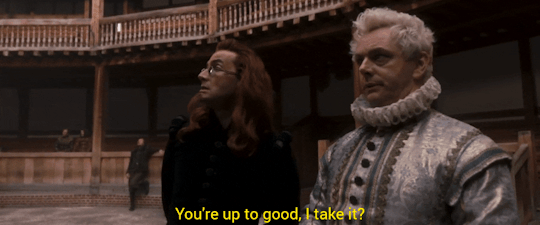
i feel like this is something crowley is well aware of - that aziraphale is not necessarily against the idea (after all, they've done it "dozens of times now"), that aziraphale certainly sees the benefit of being slightly slopey-shouldered, and all he needs is the final nudge to betray his morals, and disregard his, frankly, valid worry that crowley being caught either fraternising with an angel, or indeed doing good things, would be an unmitigated catastrophe. (see: 1827 death-slide into hell, and 1941 literally caught red-handed)
by all accounts, the Arrangement is a Bad Idea, and if aziraphale isn't blatantly clairvoyant about this, he's certainly got the better measure of hell and heaven than crowley seems to. imo crowley, however, chronically underestimates them both - hell, in particular. his platitude that hell will not care as long as they get the paperwork is proven false in the next few flashbacks, and yet he continues; if nothing else, it stops being an excuse to slack off, and instead becomes a way to keep seeing aziraphale. aziraphale is evidently reassured by crowley's conviction sufficiently enough (as well as likely wanting the same excuse) to agree.
but again, this goes against what he believes is the right thing - whether it's wrong because it's not angelic or because it would mean crowley could get hurt, take your pick (both are equally compelling) - and this is represented, for me, by crowley literally oscillating behind him. it constantly puts aziraphale on the edge of that conflict, and when he lands - when he chooses to accept the Arrangement - crowley is on his right, not his left.
1793
from the audience's perspective, this whole scene has crowley on aziraphale's right. all of it. now before anyone comes to say it's just blocking - yeah, sure, okay, maybe it is. but it could, i would imagine, have rather easily been set where crowley is on his left. when aziraphale turns around, the camera deliberately looks over his right shoulder as he spins round, and places crowley on the left hand side of the screen. so let's look at it closer with the above 1601 turning point in mind.
there's the whole thought process that aziraphale set up this 'scene' as a way to get crowley to play the hero, his knight in shining armour - and whilst ive said it in multiple posts, i'll say it again; this is not quite how i interpret it. aziraphale definitely has a means to get out of the situation (there's no miracle blocker, he changes his clothes - even if that miracle "barely counts"), but he doesn't want to perform another because of the reprimand from gabriel. that being said, the risk of discorporation, especially when he'd have to explain the embarrassing predicament that he just wanted his sweet, sweet crepes (and brioche), would probably be a viable excuse to use a miracle; it's hardly frivolous, by definition. arguably, wasting a body would be more frivolous.
so by the point that aziraphale's tried - and failed - to talk his way out of the situation, and not noticed the guard being stopped in his tracks, crowley has appeared. crowley seems to definitely have a way of tracking him - whether it's a demonic-ish power, or because of the instruction left in the book furfur has in 1941, whatever. crowley knows aziraphale is there, comes to 'save the day', and aziraphale seems genuinely elated that he's done so. he asks why he's there, crowley avoids the question, and aziraphale assumes the worst (which crowley quicky clarifies is not the case... but still very neatly sidesteps giving a full answer).
it stands to reason that after this, and 1941's 'rescue', that aziraphale would get into his head the conclusion that he vocalises in s2 - that crowley is coming to his aid, even when it's not strictly needed (and aziraphale is just simply trying a different escape route before resorting immediately to a miracle to get himself out of scrape), because he wants to, and it makes him happy. regardless, it makes aziraphale happy in kind to see him, and to make crowley happy.
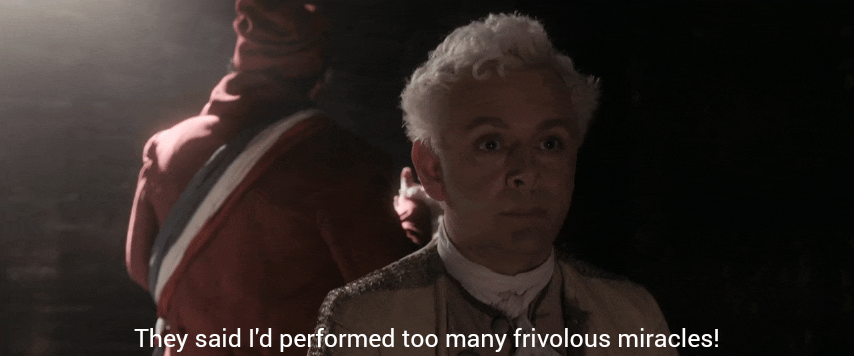
but the thing is - they both err on the precipice of acknowledging this. the way crowley drawls out his "lucky i was in the area", and aziraphale similarly says he is indeed lucky... the delivery suggests that they're both aware that this is an excuse to see each other... or, at least, aziraphale suspects that crowley isn't there by accident or coincidence.
ultimately, crowley rescuing aziraphale, as he remarks, is something that if fully acknowledged, out loud, could get himself into some hot water. aziraphale accepts this, but insists that he thanks crowley somehow - so, what about lunch? the whole scene reads as them starting to shake off the excuse of the Arrangement, and (even if only to themselves) admit that they want to spend time together. which, at the very least, places aziraphale in a moral quandary - should he want to? what danger does it place them in? what does it say about him?
the scene ends however with aziraphale placing himself firmly back in the standard position - to crowley's right - as the guard is led out to his mistaken execution. the scene obviously doesn't go into much detail about the sociopolitical landscape of the reign of terror, but i find it intriguing that aziraphale's moral conflict over his association with crowley (positioned to his left) as opposed to his apathy over the execution of the guard (positioned to his right) is as blatant as it is.
1827
okay, so now we get to one of the biggest moral dilemmas aziraphale faces. in case you missed this, im still more convinced than not that the s2 flashbacks are from crowley's POV than aziraphale's, and so there may be, to my mind, a degree of bias in how this flashback is recounted... but that's by the by. aziraphale definitely has, same as in job, a huge introspection on what he considers to be right vs. wrong, and... arguably still misses the point for the majority of the minisode.
but it's interesting to note that where aziraphale has conviction in his beliefs, he is placed on crowley's right - as per usual. where he falters, however, is in his conversations with crowley of humanity's choice between right and wrong. he claims that humanity's suffering gives them more chances to choose the right thing, which crowley counters doesn't make sense, given that their suffering - especially poverty - makes it so humanity will choose whatever improves their lives or ends their suffering, regardless of whether it's right or wrong.
despite his vocal conviction in his principle, the angelic line, aziraphale seems to doubt it privately - you can see that in his expression - he's not entirely sure, or doesn't fully understand it at the very least. when he doesn't quite know how to give things a logical explanation, he falls back to the old standby of claiming that it's all ineffable, which... okay, sure, maybe that's true. who is he to question what god has deemed to be so?

aziraphale is not an unfeeling or unsympathetic person. so his view on suffering here is, in some ways, is completely at odds with some of the lesson he learnt in job; that suffering doesn't necessarily make you more susceptible to do right or wrong things, it only drives you to do whatever it takes to survive, to escape that suffering, and its fairly immaterial whether it's right or wrong. he learns in job to go by what he thinks is right, not by what someone else has dictated he do - and here, in this scene, i do think he begins to question whether things are as black and white as he has previously rationalised - that the situation with job is not a one-off. hence, to me, he is on crowley's left - occupying the position of examining his moral identity, and his conscience.
and just for the avoidance of doubt, he seems to reach a conclusion that, no, he has the right of it - indicated by his return to crowley's right. he thwarts elspeth with the body, and tries to further thwart the necessity of bodysnatching by attempting to convince dalrymple that if he wants the bodies so bad, he is at fault for exploiting the poor and desperate. once he holds the little boy's tumour, however, his moral stance shifts, and he starts to see the benefit to the whole endeavour - and returns to elspeth and morag, but still on crowley's right. he hasn't had a dilemma here, just a sharp realignment now that he has the context of human suffering literally handed to him. his stance on the issue literally turns on a dime.
1941
it's not until the graveyard, when crowley points out that only the rich have the means to safeguard their remains, and that by aziraphale's reckoning that sounds like the right way of the world, that aziraphale is once again forced to reconcile his moral dissonance. in this scene, aziraphale is once again on crowley's left as he examines this.
he continues to be on crowley's left, funnily enough, when they enter the mausoleum. aziraphale is warring with the decision to save morag, citing that it's not technically allowed but he has the power to do so, and it's his fault, so he ought to do it. regrettably, however, he's too late - and morag dies. and when elspeth intends to take her body to dalrymple, crowley still pointedly places himself to aziraphale's right, suggesting that aziraphale continues to be in internal conflict over the situation. something he feels is wrong but... well, "it's a bit different when it's someone you know."
for the rest of the minisode, however, crowley and aziraphale return to their traditional positions; and i think this marks where aziraphale does, in fact, learn something from the whole encounter. he still hesitates at giving the money to elspeth, but it's weaker than it was before; he follows crowley instructions to hand it over with little protest, possibly having seen that humans having a means to survive will, in fact, make it easier for them to make choices.
be warned; the 1941 examination is lengthy. however, i think it especially poignant in that this seems to be where we depart from aziraphale having issues reconciling his morals as concerns right and wrong in general terms, and instead it contextually hinges in direct response to how his relationship with crowley himself changes. it becomes a more specific introspection into how aziraphale handles the predicament of realising that he's fallen in love with crowley, and the conflict that this poses for him.
for all of the church scene, we see that crowley is positioned to aziraphale's right. this is in stark contrast to where we left off in 1862, when crowley is completely on aziraphale's left as per tradition - where aziraphale stuck by his principles on the issue of the holy water, that there is no way he'd ever give crowley the means to destroy himself (and then adds, when that doesn't dissuade crowley, that gaining it would also place aziraphale himself in a dangerous position), and doesn't sway from this. in 1862, he enters, remains, and exits entirely on crowley's right.
but back to 1941; upon reflection of the specific moments where he and crowley switch positions, or at least their positioning is reversed to the audience - as i said, i think 1941 might be where aziraphale starts to particularly feel conflict around crowley on a personal level.
crowley enters the church, and throughout is, on aziraphale's right instead. we could look at this the same way as we do the 1793 scene. but in 1941, with the context of the holy water, it feels like more than that (especially when you consider that crowley calls attention to the holy water in the church itself - holy water that doesn't serve any purpose within the 1941 flashbacks, but obviously inspires his heist plans 26 years later). aziraphale and crowley left off, canonically, on a bad note; they argued over it, biggest argument they've had (perhaps even the first?), and they've been disconnected as a result ever since.
but here crowley is once again, by my reckoning, very suspiciously arriving at the exact right moment (and before aziraphale even has a chance to get himself out of the situation which - let's face it - aziraphale absolutely could do), to 'save' aziraphale even after everything that happened, even after a huge argument that, again, canonically separated them for 79 years.
this arguably puts aziraphale into a quandary yet again; crowley has been the bigger person, to reach out first, and on top of that has done so by way of 'saving' him from literal discorporation, as well as associated embarrassment. aziraphale is still angry with crowley by the time he arrives at the church, and this is only added to by his assumption that crowley Has Something To Do With The Nazis, but he's made to very quickly re-evaluate his bias, his anger, and the measure that he previously had of crowley as residue from 1862. perhaps (spitballing here) aziraphale thought in 1862 that crowley was exploiting their friendship, and was manipulating him. and look - crowley may have in fact been doing just that, out of fear, but he still came to aziraphale when aziraphale 'needed' him, like nothing had ever gone amiss. and i daresay that fucks with aziraphale's head ever so slightly - makes him question, once again, what is the right or wrong thing to do.
and then we move to the post-bombshell but pre-Bombshell moment; 'lo and behold, crowley is now suddenly shown to the audience as being to aziraphale's left - back in the usual positioning. in those few moments, as the dust settles, aziraphale seems to have made up his mind, resolved his moral dilemma, and attempts to break the ice; "that was very kind of you." it works, puts them back into their familiar territory and dynamic... he's resolved his inner conflict that crowley did the right thing, the better thing - to set aside and (even if temporarily) let go of their argument, because they ultimately care very much about each other, and can always rely upon each other.
but the thing is, the positioning is the traditional way around... but only temporarily. crowley reveals that he saved aziraphale's books, hands them to aziraphale, and crosses over him, placing aziraphale back on crowley's left, rather than his right. in this scene, as we all know, aziraphale abruptly realises that not only does he love crowley, but that crowley, maybe, might just love him too. and it plunges, i think, aziraphale right back into the theme that continues through the 1941 minisode in s2; that he's now at war with himself, all over again, over his newly processed feelings for crowley.

with that in mind, let's continue with the s2 1941 minisode. because wow do we really get into the weeds of this left/right placement. so we've left the s1 1941 flashback where aziraphale has abruptly realised the depth of what he feels for crowley. regardless of the saucy subtext of aziraphale's lines in the bentley, he tries to coax out of crowley a way in which he could possibly repay his kindness, and is knocked back*. but once we get into the windwill, aziraphale volunteers to cover for crowley when he bollockses up with the whisky bottles, an act of reciprocation as far as aziraphale can brave at this early stage - and all the while, aziraphale continues, from the rubble scene where crowley crosses from the right of the screen to the left, to be on crowley's left, rather than his right.
(*i do however find it rather telling that instead of crowley delivering on "lift home?", he chooses to take a detour and bring aziraphale along with him... a scheme? to keep in aziraphale's company for longer? who knows)
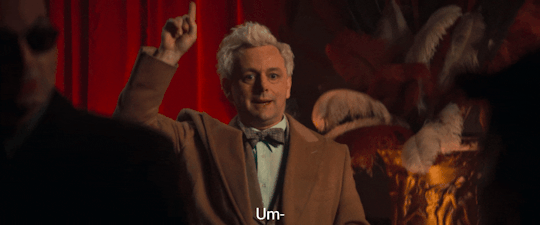
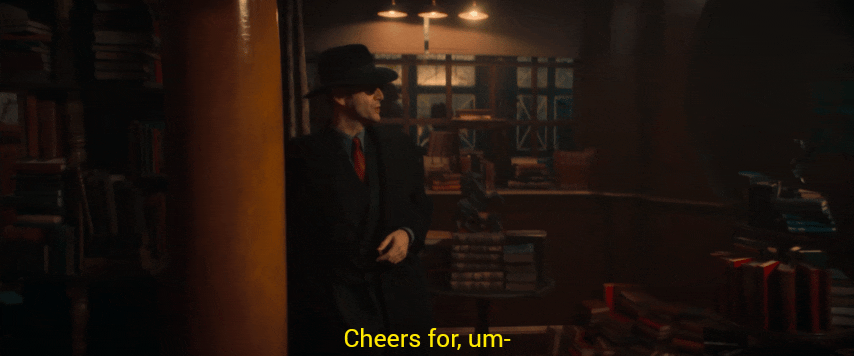
we could interpret this as aziraphale being at odds with himself because he's doing what is ultimately a personal favour for a demon, and in reciprocation - but i think he's far beyond that being An Issue at this point. yes, he's taking this opportunity to pay back the favour he feels he owes crowley for the "very nice thing [he] did" because road head wasn't cutting it, apparently, but his line? about crowley being his friend? no - aziraphale is still sitting on his inner conflict of realising, with all the subtlety of a sledgehammer, that he's in love with him. this positioning continues all the way through the bookshop scenes.
given the dialogue in the scene, it's a continuation of the above moment in the windmill; aziraphale is fully cognizant of his newly realised feelings for crowley - we know this from his twice-hesitation of the word 'friend' - and is still stuck in that realisation, possibly even warring with himself internally as to where to tread that fine line... does he go for it, acknowledge it out loud? is now the time? has he fully understood what crowley was, he thinks, trying to communicate to aziraphale? is it right? would it put them in danger?
this whole internal conflict is set aside somewhat by the magician plot, and when they leave the bookshop, leave its safety and enter into unfamiliar territory, aziraphale is back on crowley's right. i don't think it's because he's made a decision, or resolved to anything, but more he's had to bury it momentarily, and put the mask back on again. it doesn't slip until aziraphale is trying to convince crowley to engage in the bullet catch, in a small moment that aziraphale thinks is unobserved by anyone. i don't think aziraphale can't quite miss crowley's hesitancy, and even mimics his head movements to maintain eye contact, cornering crowley into agreeing to the trick.
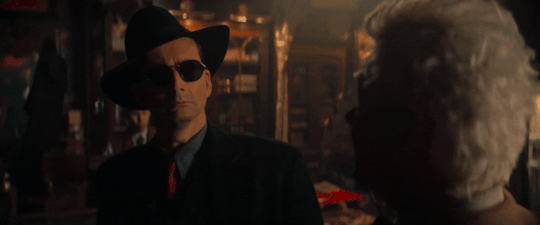
however, i think the fact that - once again - aziraphale ends up placed to the right of the screen, rather than the left, indicates potentially that aziraphale is still conflicted. his interactions with crowley here scream of aziraphale levelling up their dynamic by placing his complete trust and faith in crowley, of wanting crowley to help him - of reciprocation.
and yet there is still the suggestion that perhaps this is cutting it too close, and that aziraphale is, in his overall excitement, losing sight of what they - as an angel and a demon - can and can't risk. this foreshadowing ultimately pays dividends later on in the minisode; this very closeness is what brings them, as close as they have been so far, to near-destruction as a result of their affiliation... and that's just when, ultimately, they were just friends; what would happen if something more was acknowledged?
let's continue this onto the stage; crowley crosses aziraphale in the reverse motion that we saw at the end of the church scene, entering the screen from the non-traditional left hand side, and crossing back over to aziraphale's left/right hand side of the screen.
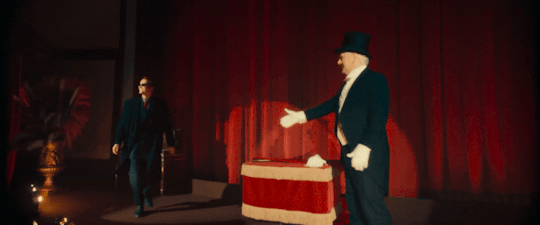
this to me feels like aziraphale is resolute in his faith in crowley, despite the issue surrounding the miracles; he doesn't abandon the performance... not just because it could be embarrassing for him to do so, but because, miracles or no miracles, he trusts crowley to do this. the issue that remains is convincing crowley to trust in his trust which, ultimately, crowley does - and the trick is performed flawlessly, only cementing aziraphale's conviction that his faith in crowley is not misplaced. sure, he's scared in the scene once he realises miracles are no longer a safety net, but his trust in crowley doesn't waver.
but then! then! we get to the dressing room. we see most of the scene, understandably, from behind aziraphale and facing furfur - this places aziraphale on the left-hand side of the screen as per usual. but in the context of his position vs. crowley's, they are reversed. aziraphale is positioned to crowley's left, instead of his right.
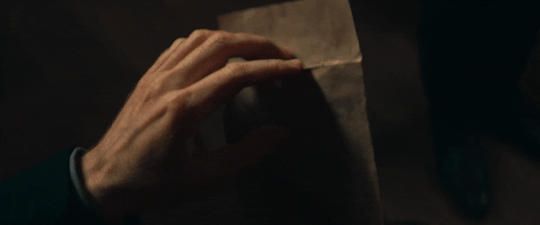
this calls back to the dilemma aziraphale faces right back in the bookshop; what risk is there in aziraphale potentially acknowledging his feelings out loud to crowley? or reciprocating, as he suspects it would be?
crowley is being threatened, and their closeness, their affiliation, their fraternisation, has directly brought the threat to their door. it's the bucket of ice water poured over them, over aziraphale in particular, that to be anything beyond idle acquaintances will bring danger and despair - because it literally would place crowley in harm's way. that brief moment of elation and contentment, of possibly even considering confessing what he feels - reciprocating, as he sees it - to crowley, is suddenly wiped away.
aziraphale saves the day of course, but it's a close call. it's too close, and not something that he can risk again. once furfur and the nazis leave, and aziraphale and crowley return to the bookshop, aziraphale is back on crowley's right. he's resolved to keep the status quo, because he's now been directly exposed to the risk of there being something more. that continued closeness with crowley as friends, let alone as anything else, puts crowley directly in harm's way. and it's a risk he cannot take; his dialogue speaks of him trying to impress on crowley that he cares for him, but compared to before, he now is keeping him at arms length.
a brief moment of consideration for how s3's 1941 flashback could go. it may initially continue on with this traditional placement; that aziraphale is resolute that despite what he feels, and suspects what crowley might feel, it is not worth the risk of losing him completely.
if there is any romantic push from crowley, as i suspect hope there will be, i'd imagine the positioning to be reversed, to show the last glimpse of aziraphale being tempted to it, of having to make a very clear, firm decision on whether to pass the point of no return.
but then aziraphale, id imagine, would come to his senses, and as he stands firm on keeping his emotional distance from crowley, to not risk his safety, and ultimately reject him, their placements would return to their traditional position.
1967
im finally going to finish off part one (part two will be written... eventually, and look at 2008 onwards) with a small look at 1967. this is difficult, because - for our sins - uk vehicles are right-hand drive... so there is literally no option but to have them in the reverse positioning.
because of this, i don't think it's fair to single out this one interaction of them in the bentley as being an instance that fits the above pattern - at least, not until all bentley interactions are examined. plus, neil confirmed that the positioning of aziraphale and crowley to each other (and, i imagine, to the audience) was very deliberate, but something they couldn't account for in scenes in the bentley.
regardless - the dialogue therefore, in my opinion, has to pull even more weight (and by god does it ever) in this scene to show aziraphale's turmoil over the holy water. that being said, even in the first few sentences, we know that aziraphale has actually made up his mind to give crowley the holy water; he doesn't like it, hates it in fact, and we can even see how much it devastates him to do so - but he has surrendered to handing it over in order to prevent crowley doing something dangerous and stupid in order to obtain it without aziraphale's involvement.
it's the lesser of two evils - aziraphale is caught between the devil and the deep blue sea - but he chooses to give it to him. wraps it in a tartan flask to remind crowley of what exactly the holy water means to aziraphale, and remind him of the gravity of the request. remind him of what aziraphale stands to lose if crowley was lying, if crowley in fact does intends to use it on himself, and also to remind him that the request is - at this point - a breaking point for aziraphale. their relationship to each other, whatever it is, is re-contextualised by this.
a lot of the context of aziraphale's last line is clearly wrapped up in the missing s3 1941 flashback, but it's still nonetheless clear that aziraphale is not necessarily conflicted over this decision anymore; he doesn't hesitate to give it to crowley, but merely states that he will do this for him, knowing the risk, because the alternative is worse still. whatever happened in 1941 means that aziraphale still can't quite bring himself to be close to crowley, cant risk anything anymore, but he still doesn't hesitate.
part two to come soon!
#the mother of all metas this nearly killed me#good omens#s1 meta#s2 meta#flashback meta#1941 spec#aziraphale meta
83 notes
·
View notes
Text
Neither real, nor a spirit. But a metaphor.
The symbolical scene with the White Wolf is the best scene in the entire movie. Deep, epic, tender, emotional, personal and majestic. The authors intentionally made this scene mysterious and vague, so at first glance you won't understand, whether it is real or supernatural or it happens metaphorically.

What we know for sure, the White Wolf is a male and a symbol of Balto's wolf side and self-acceptance. Both the director of the original movie, the script and all concept arts and storyboards confirm this. What's interesting, early versions had more hints that the White Wolf is a metaphor. I'd say, in the scripts the line between sleep and reality is way more clear than in the final movie. Let's look at them: In 1992 script, when Balto encounters the White Wolf at first time, the blizzard stops, there's only white light, and the White Wolf and Balto are in silent snowy place. But once the White Wolf walks away after they howled together, the blizzard starts again. We see the more clear confirmation that the White Wolf is a symbol. In 1993 version in storyboards we see, how the White Wolf is literally materialized in blizzard — Balto notices his paw, looks up and sees vague white mirage, which takes the shape of the White Wolf. Plus, when they howl together, the camera circles them and hence directly hints that the White Wolf is Balto's wolf half, and now they finally become one, so after this the White Wolf disappears, and Balto wonders, how it is possible. He howls happilly, and only after this the sled dogs hear the howl and feel fear. Another 1993 version is a bit extended and has own hints that the White Wolf is a symbol. In the beginning of this sequence the despaired Balto notices in the snowstorm the weak mirage — the White Wolf howls in the blizzard among tiny sunrises (or light of lantern) before interaction with despaired Balto, while in the end of this scene Balto embraces his wolf ancestory and howls with the White Wolf, but after the White Wolf disapperas in the wind, Balto seeks the Wolf and then howls in the same pose the White Wolf howled in the beginning of the scene, but already among calm snowstorm and under the sun. In 1994 script it's pretty similar to both 1992 script and the final version — the wind and snowstorm calm down and stop during the presense of the White Wolf, only white light, but after Balto howls to him, and then they howl together, the snowstorm starts again.

Plus, in early versions the crew even had different ways of interaction between Balto and the White Wolf. In early versions the White Wolf still was the silent and mysterious character, depicted as a male, but he had a bit more personality — he made the pawprints for Balto, so the wolfdog could compare his paw to the wolf paw, he taught Balto how to howl and cheered him up, he smiled to Balto and even nuzzled him, when Balto failed many times in howling, the White Wolf howled to him encouragely, in another iteration he was a bit more strict and severe old male (what also implies that the original movie wrote Balto's father as his wolf side). And none of these early versions ever made even a tiniest hint, which could imply that the White Wolf is Balto's father. All these early versions show that Balto doesn't know this wolf and firstly is afraid of him. So, what's about the visual hints in the final movie? Previously here I made the detailed post, where I mentioned all moments in the original movie, which hint Balto's mother as a sled dog husky and Balto's father as a wolf. So, why not to make the similar post, but about the White Wolf being a symbol? Of course, the visual hints in the final version are more subtle. 1. Already the beginning of this sequence gives the visual hint that the White Wolf is not real — the wind moves toward Balto, so Balto would smell the wolf's scent and hear the wolf's steps way before the White Wolf came too close to Balto. Balto exactly felt his presense and then was surprised to see the paw and then the large majestic White Wolf.

The White Wolf appears exactly near Balto just like he does that later... (wow, they even blink simultaneously — the White Wolf reflects Balto's emotions)


...and after Balto's first howl (and, well, the scripts also confirm that as well). 2. The White Wolf is surrounded with warm colors — yellow, pink, purple, light-red etc.

Once he disappears, we see only cold colors — blue, white and light-blue.


Yupp, subtle visual hints. 3. Look at the environment in this scene exactly when Balto interacts with the White Wolf. There's no medicine box or mountains etc. The White Wolf and Balto are in endless white place with blizzard and northern lights.



While in reality, i.e. when Balto is alone, and there's no the White Wolf, we can see the box and the mountains.


The pawprints here are the bridge between the reality and the dream, leading Balto to self-acceptance. Because when the White Wolf left Balto, there's no pawprints, when Balto (after Boris's words "But maybe a wolf can...") decides to find out, who he truly is, we see the pawprints, and in the next scenes we see only one pawprint, which later disappears as well.

4. The presentation and the size of the White Wolf. In the beginning of the scene you can't understand, how large the White Wolf is — but both Balto and viewer think he is gigantic. The White Wolf towers over Balto, and the protagonist feels both fear and shame.

However, when Balto finds out, who he truly is — a wolf — and embraces his wolf nature and howls, the White Wolf is not that large as we thought in the beginning. He is still bigger than Balto, but not so much. 5. The reaction of the sled dogs — they are scared of the wolf howling. But it is exactly Balto's howl. They didn't hear the first howl of the White Wolf, they didn't hear Balto's two howls to the White Wolf, and they heard nothing, when Balto and the White Wolf howled together.

It is the brightest hint that the White Wolf is not real. And it is not a spirit, because the original film is not a fantasy film, there's no supernatural elements. So, yes, I can only admire, how masterfully the authors nailed this scene. All this scene happens in Balto's heart/mind, it is his inner fight. The powerful symbol of Balto's noble and pure true self, the noble and pure white wolf. True masterpiece.
#balto#balto movie#balto 1995#balto the white wolf#white wolf balto#balto white wolf#balto heritage of the wolf#heritage of the wolf#balto 2 wolf quest
8 notes
·
View notes
Note
Hi, how are you? Do you remember the post you wrote on Aaravos and Callum about how they could be narrative foils? Since Act 2, I've been trying to figure out what could happen between those two. And apart from the fact that I feel they're going to face each other at some point and Callum is terrified of him. I don't see that much, do you have any ideas?
Hey @kilfeur! I'm doing well, and hope you are too! Sorry for taking so long to get around to this, but better late than never I suppose.
Yes, I think you're referring to the bit I wrote here about Aaravos and Callum being foils. I do remember that, and I still think it's largely right. Going into Arc 2, with Aaravos singling out Callum and possessing him and promising he'll play right into his hands, it is inevitable that the two will be confronting each other.
But I think there's another layer to this. Aaravos doesn't just possess Callum because he's yet another mage for him to prey upon and exploit. After all, he never did so Viren or Claudia, or any other mage, preferring subtler manipulation. So what makes Callum different?
Because I think that, while Callum is afraid of Aaravos, the truth is that beneath his bravado Aaravos is also afraid of him. To Aaravos, Callum symbolizes what all evil truly fears: the courage of good people to oppose it. This is what defeated Aaravos three hundred years ago, and it's what could defeat him again. And of the protagonists, only Callum truly has the power to do that directly.
Or at least that's what Aaravos believes. I think that what will ultimately do him in is that he becomes so focused on taking out Callum - either by controlling him or eliminating him - that he overlooks that his true strength lied not in his knowledge of magic, but in his friends and allies. As Aaravos says in the s6 teaser (in his best impersonation of NDT) "we are all of us stardust, held together by love for an instant."
But as Callum learns deep magicthe Star Arcanum next season, that truth of interconnectedness would also be the key to him learning the power to challenge Aaravos, either directly or in tandem with others. But regardless of what happens, if something ultimately brings down Aaravos, Callum would be at the tip of that spear.
And that terrifies Aaravos to his core.
24 notes
·
View notes
Text
Alright so part two of my explaining BSD french authors:
Arthur Rimbaud !
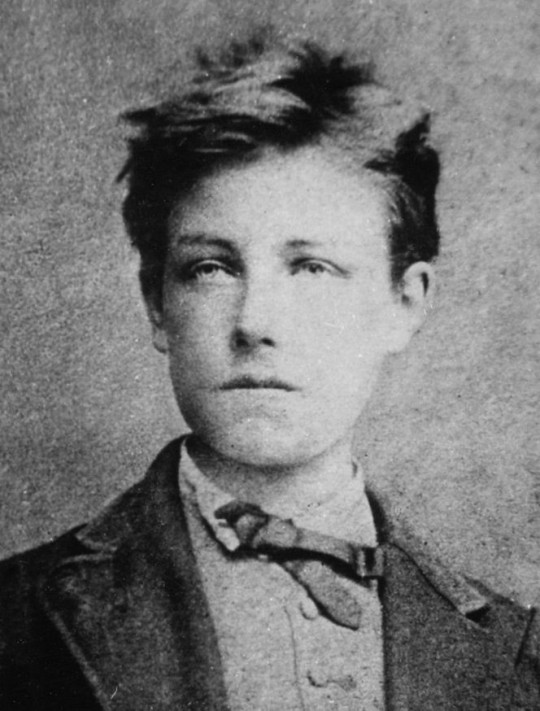
This is the boy. Looks young, right ? That's cause he's seventeen in this. (Funnily enough, he's exactly the same age as Verlaine's wife. Verlaine, though, is 27 at the time they meet. Yeah, I wasn't kidding when I said he was a piece of shit.)
Rimbaud is kind of THE poet of teenage rebellion. He was born in 1854, under Napoleon III to place him back in his historical context. He wrote quite a bit in opposition to Napoleon, actually.
His father is absent at first, and then not here at all later. He has... A complex and complicated relationship with his mother. He gave her a disrespectful nickname, she was seen hitting him several times (although at the time that's hardly surprising...), but at the same time when he asked her to go see him in London (at a time where the trip was very expensive, and she'd never left France in her life before that) she came, and his sister described him then as "the happiest I'd ever seen him". She's often seen as the source of his inner anger and rebellion.
What he hates for sure, though, was living in his house, with his family, and especially in his hometown, Charleville, which he despises.
He's especially known for having fled his house a lot, as in several times a year, for several days every time, walking during the day and sleeping on the road during the night. His most famous poem, "Ma bohème" (unstranslatable title because "bohème" is a french concept, but it basically means living your life day after day, in communion with nature and/or your dreams, often with an artistic dimension and no money whatsoever - also has travel connotations because it derives from "bohemian"), actually talks solely about that.
He wrote from his fifteenth to his nineteenth birthday, and was - still is - seen as a genius, being one of the most influential french poets ever despite having written for only four years. He was famous for being uncontrollable, and it translates back to his style : he took extremely traditional forms and changed their rules. (Which weirdly enough actually kinda fits with Rimbaud's ability ??)
If we ever have a Baudelaire in BSD, know that his character will probably look up to him, seeing as Rimbaud is usually seen as continuing Baudelaire's legacy of completely revolutionising french poetry. His two most famous books are "A Season in Hell" and "Illuminations", his last one. His literary movement is symbolism, invented by Baudelaire, characterized by melancholy and an attraction to the ethereal and mysterious. Rimbaud himself thinks that "the poet must search and describe the unknown" and, well, too bad if he sacrifices his sanity. He's also one of the first after Baudelaire to write prose poems.
He stopped writing, forever, at twenty, after the Verlaine fiasco. Actually, he wrote "Illuminations" directly after, then gave it to Verlaine so that he could get it published instead of doing it himself.
That's where his life gets really weird. He tries to learn seven different skills and languages while traveling everywhere, fails, his sister dies and he shaves his head for her funeral, is forced into the military to fight in Java, then deserts, gets hired on a boat on his way back and becomes a sailor, then tries to get hired in the American Navy, doesn't get any answer, goes in a circus then a factory, and all of that while traveling everywhere in the world in the space of about three years.
Nobody knows where he was for the nine months after that - and during all of this, everyone who knows him is hoping that he gets back to writing poetry - and then he goes home to help his brother with his farm before leaving, AGAIN. He walks from France to Italy, then gets in a boat to Alexandria, where he works in a construction project to manage the workers. This keeps going for about eleven more years, so I can't list everything this guy did : we'd need a whole ass novel.
He stays in Northern Africa for almost the rest of his life, although he travels quite a lot in that region and never stops moving. In France, he's still as famous as he was at 17, and several eulogies are written for him without his knowledge. We can also note that he does weapon trafficking, for a very short period, at some point. He writes to his family that he's "bored", of all things. He's described by the people he meets then as "smart, sarcastic, not very talkative, never talking about his past".
He then dies in Marseille, in his thirties, from cancer in his leg.
I'm gonna be honest : I don't like his BSD characterization. Rimbaud's a wild card, a chaotic teenager, as an author. I also ! Hate ! That he's Verlaine's mentor. But that'll be the next part, where I'll talk of IRL Rimbaud and Verlaine.
Previous and future parts are in the #IrlBSDFr tag.
#IrlBSDFr#arthur rimbaud#bsd rimbaud#bsd rimlaine#bungou stray dogs#bsd verlaine#bungo stray dogs#bsd spoilers
29 notes
·
View notes
Note
"I had the time of my life fighting dragons with you." | Jellal X Erza
WOO, I finally finished this thing I wrote a week ago. Go me! I decided to go very lose with these prompts and use them as inspiration and not direct quotes. Anyway
1776 words
Rated G
For Jerza Week Day 4: War, if I am not too late :D
Fairy Tail Fantasy AU
quick fantasy au overview: jellal is king of the fiore kingdom, wendy is his sister, born with the red lines on his face is seen as cursed erza is grown at court but not royal and head of his army the ice emperor is exactly who you think it is to avoid war jellal got engaged to the daughter of the heartfilia estate (lucy) to gain further funding and influcence, in hope to deter the ice kingdom (this evidently did not work out) neither jellal nor lucy actually want to have a relationship, they marry for convenience (there is a lot LOT more but this is not important for this story, but please come and chat me up about it xD)
He bit the skin on the outside of his finger, tapping his foot on the ground beneath him. The map in front of him draped with little wooden figures that were wearing the same symbol he was wearing over the side of his face, the red long lines that had marked him once he had been very small. Red was in his future, they’d said when he was born and this red, most likely, was approaching faster than he had wanted to.
Jellal could taste the blood on his tongue and he finally pulled his pointer finger away from his teeth, but his foot tapped more aggressively on the stone floor than before. Even in the last minutes of the previous meeting he had barely been able to listen, his heartbeat strong in his ears with nerves. He had asked if there was no way around it all, but only got heads shaking and shoulders shrugging.
War, for sure, brought the tears and the grief and the red of blood. That was his destiny after all, that was what everybody had said. Still, he had held on to the vague hope that he might be able to put it off. Build up a Fiore's military might enough that the Ice Emperor didn’t feel it in himself to expand.
Jellal let out a deep breath and then banged his fist to the table. That was the reason he had gotten engaged after all, to make sure the income was flowing a little easier, to build up defences and yet, the Ice Kingdom was still invading and the war was still coming.
Maybe he should have been ready for all of this, since it was literally a prophecy given at his own birth, when his father stared at his cursed face and frowned, or at least that was what all the older maids in the castle said. “The prince is cursed”, they’d whisper when they’d think Jellal wasn’t in earshot. Always, wherever he went it followed him. He was good, he was amiable, he was even regarded handsome by some, but most just looked at him as a cursed item– well so it was. Eventually he went and saw a witch to ask him if it was true, if the mark on his phase meant a curse. Slowly she followed the lines of his face with her long, cold fingernail and then she said. “There is red in your future.”
Back then he was young and shrugged it off as just a stupid sentence, but the older he got and the larger the Ice Kingdom expanded the more aware he got that it meant war. Red was the blood that would be spilled, maybe on both sides, to end this conflict.
All of this might have not happened if he hadn’t been born cursed, he thought, or if he hadn’t been born at all. His little sister, after all, seemed much more fit to rule than him.
“Nervous, lord?” A voice spoke from the backside of the room and it echoed from the walls directly into Jellal’s heart. He looked up and his heart pulled together for a moment.
By the door was Erza Scarlet, her helmet pressed under her arm next to her sword. She kept her hair in a ponytail when she was working, because the length of it would get in the way, especially with the helmet on her face. She smiled a little, eyes shining as always when she saw him and he wanted to drop everything to run to her, as he always did when she looked at him.
“I don’t like the idea of a war,” he said truthfully. “I wished this had never happened.”
Erza walked forward. No other knight in his guard moved in his presence without Jellal allowing it, but Erza was different, she was not only the head of his army, but had also known him ever since he could think. She had all his trust and was all his skill.
She was everything, and Jellal had loved her for so long that he couldn’t say exactly when it started.
“You said as much at the meeting, lord,” she said and stopped next to his chair just close enough that his nose could catch the smell of her hair. Always roses, so strong, as if she bathed in it. He had meant to ask if that was the case, but eventually chickened out. It was just not appropriate to ask a lady such a thing. “But now that the Emperor has closed an alliance with the water nymphs of the mountains…”
“And you said as much in the meeting before,” Jellal averted his eyes again away from her. He knew what her opinion on this entire operation was and she very much knew that he was against it, unfortunately he was thoroughly out of options, out of time, and outvoted.
Erza put a hand on his shoulder as if to comfort him and reached out to her fingers even though they were fully armoured and cold. The only thing calming him down was her proximity. “I feel like this-”
“It’s not your fault, lord,” she cut him off before he could even say it. “Nothing that you did has brought this upon you. You are not responsible for the actions of others. The curse on you is not real.” She had always said that to him. Erza did not believe that there was something wrong with him. Erza wasn’t worried he’d turn into some terrible monster down the line. “In fact, you just recently made a tough decision to avoid all of this, because you love the people in this kingdom so much.”
Jellal looked up into her face and his heart felt like it was going to burst again. He knew that Erza was hurt by the fact that he had gotten engaged, even if it was for money only, yet she never openly talked about it. She had just grown more distant in the last months, no matter how often he had ensured her that the wedding was just for appearances, that his fiance had as little inclination to love him as he had to love her. Still, Erza had moved out of his grasp and moments with the two of them alone like this had become rare.
“I understand the war, more or less,” Jellal said and fixated on her brown eyes. “I just don’t know why you have to go with them. Shouldn’t you stay here with me - I mean, to defend me?”
He knew he was being selfish, that thinking of Erza above all the other knights in his army was not what a commander in chief should do. But he had immediately felt worried when she had announced to be leaving, to be going to war, somewhere where he could not talk to her, see her or protect her. He could not shake this feeling that his prophecy meant that she’d never come back.
Erza chuckled a little: “You made me head of your army, lord.”
“Yes, to protect me,” Jellal shot back. “To always be by my side.”
She blushed a little and averted her gaze. “We aren’t children anymore, my lord.” The smile on her face turned thin. “I am no longer fit to stay by your side, we both know it.”
Jellal grinded his teeth together and then stuck the finger back between his teeth to eat the skin there. Erza was the daughter of the dragon tamer that had for many years lived in the castle and served Jellal's father. Eventually, shortly after Erza’s birth, her mother had disappeared and with her the dragons of this kingdom. Raised as an orphan on castle grounds she had no standing, no real family or last name and had only been trained as a knight because of her excellent connections to the prince.
She was not a suitable marriage candidate for Jellal, she had always known this. He had always known this- still, the hope had always been there.
“There is nobody else I would want to be by-” Jellal began but Erza shushed him.
“We can’t play pretend anymore, my lord. You are the future king and I will always be your loyal servant,” she said so matter-of-factly that his mouth hung open without an idea of what to retort. “I enjoyed those years of dreaming. The what-if scenarios. But it is not to be and it never will be.”
She had said something very similar when he had announced that he was going to be officially engaged that this meant their childhood together had officially ended. One would think someone as high standing as Jellal had power of his life, but it seemed like the closer he was getting to the throne, the less agency he had. The carefree days of their youth seemed so far away that it almost seemed like he had dreamed them.
As if she once again read his mind, Erza drew closer to him, her thumb brushing over the fabric on his shoulder. “You can do this,” she whispered, her nose almost touching his cheek. “You have your strengths in leading and I have my strengths in fighting - remember how that was when we played dragon-killer?”
Jellal turned red, not only because this brought back the memory of him tying a bedsheet around his shoulders like a cape and ordering Erza around, but also because her closeness made him uneasy.
“I have always relied on you more than necessary,” he said.
“And now you will rely on me once again,” Erza replied. He wanted to retort that he could better rely on her if she wasn’t leaving, but she completely deflated his fighting spirit by leaning forward and leaving a light kiss on his cheek, right on his cursed mark.
Erza didn’t wait for him to find his speech again instead she straightened out her back and walked back to the door, not, however, before squeezing his shoulder one last time.
He found his composure again before she could open the doors. “Come back,” he said so loud that his voice was echoing off the marble walls. “Make sure you come back to me.” He got up out of his chair. “That’s an order.”
When she turned around his heart stopped for a moment. The way she was smiling, the light in her red hair, the blush on her cheeks - it took his breath away. Erza fully turned back to him, pulling both her legs together and then bowing her head.
“Yes, my lord.”
#jerza#jerza week#fic tag#jellal x erza#jellal fernandes#erza scarlet#there arent even fairies in this show!#I FINISHED ONE OF THESE PROMPTS IM SO PROUD#the power of jerza day approaching LOL
24 notes
·
View notes
Note
Greetings, I hope that you are well: I'm very interested in your Dimentio/Merloo theory. It is a great theory, and I think it works quite well as I believe it ties in quite a few loose ends and serves a wonderful further contrast between Dimentio and Bleck's characters, though there are a few points I would like to enquire about towards the theory:
Does the theory pose that Merloo IS the son of the Master Magician if Dimentio is Merloo, if that's the case, wasn't the son not heard from again after the accident? The usage of "some say" presents the survival of the son is ambigiuous so...Wouldn't the people know that Merloo is the magician's son if he is presented as important enough to get a stain-glass window?
Is the prognositicus directly stated to be difficult to decipher? I understand that the Light prognosticus would be difficult to transcribe as it was activley written. But who actually wrote the dark prognosticus? And when was it actually made? "But no person after obtaining this amazing book ever found happiness". The fact that obtain is used here possibly suggests to me that anyone who had the book in their possession never found happiness and to me that implies that there isn't an "old language" barrier needed to be crossed for the Dark Prognosticus to be read. The Light prognosticus was written by the ancients to counter the prexistimng Dark Prognosticus, so to me it makes sense that the Light Prognosticus would need to be deciphered to understand, but not the Dark. I may be missing something though.
This would imply to me that Dimentio still could have stolen the Prognosticus when the count wasn't looking, even if he wasn't Merloo, and still would have been able to read it.
(I wouldn't be surprised though if the writer (Co writer Merloo) who wrote the light prognosticus by using the Dark Prognosticus this measure likely DID go insane having to read the Dark Prognosticus and transcribe it in his language thoughm, the hypnotic - And that does make me ask why Merlumina didn't go insane if she ALSO contributed to the writing of the dark prognosticus but this is a bit off topic-)
If none of the ancients in the bridge between Flipside/Flopside are alive anymore, only their descendants, is there direct evidence of the lifespans that could dictate that could Merloo still be alive? You make the point of "the public had have had no way to know of the Pixl Queen until the uprising of 1,000 years later". Please can you explain the evidence of this towards the ancients being able to live at least 1,000 years? I probably missed something when going over Carson's dialogue- You also mentioned that the apprentice had lived for at least 1,000 years. Is there direct proof of this within the game?
Is there much direct symbolism between Merloo and Dimentio? As you touched on in the Lore wiki, the visual ties and pallete are very weak, and symbolism across the type characters in that respect doesn't seem to viable. Even though the painting has Dimentio's colours, the painting also has other colours in the background that aren't affiliated with him. Had Merloo any symbol of a diamond, or any design connection of the sort, I think the connection maybe be a little bit stronger?-
"Oh, and some say the son of the magician miraculously recovered from the accident. If so, the bloodline of the magician could endure... Did they find happiness? Or otherwise..." Was this line different in the Japanese verssion to refer specifically to the son finding happiness? Doesn't this alter the meaning of the line quite a bit?
I think that the theory is a unique and interesting approach to Dimentio's characater and makes him seem far more interesting, and honestly I'd love to see it being official lore for the character, though, when comparing how the rest of the game presents its lore, the theory seems a bit...farfetched, even with the abundance of evidence provided.
When looking at how lore is generally presented in the game, the lore seems a bit...Scattered..outside of Count Bleck and Timpani's as well as some of the direct lore you can find in locations like King Crocaus's castle detailing the stories of his family tree and the glass window section of Flipside's main Co-founders/contributors. The rest of the lore practically comes exclusivley from Carson and is relativey... Easy to put together, so to speak.
I have no doubt that the writers wanted to tie in Dimentio with the Magician son part of the theory, as the term "magician" has been used to describe his character and I certainly agree that Merloo is connected to his character a least in some way as he also uses dimensional magic and has the key word "magician" to determine him and as there are no descendants of Merloo present, but that lack of really any noteworthy visual connection and the way the other lore is generally presented is one of the few reasons why I think him actually being Merloo might not have been the intention despite how good the theory is?
Apologies for the ask and I hope that you have a nice day!
Glad you asked, and happy to answer! This will be a very long one. So long in fact that it broke the character limit again, so it's Google Doc link time again. https://docs.google.com/document/d/1eLguKB4Guepv55BkRF0i3U98_2ObJ3SVWAHETEDjptQ/edit Enjoy!
#super paper mario#mario lore#dimentio#merloo#dark prognosticus#dimentio is merloo theory#merlumina#drake rants
7 notes
·
View notes
Text
New collar
I got a new collar today! I've been without for... probably over a month now (my owner has been traveling and too busy for the collaring ritual we both deserve).
I've been his collared slave for about three years now, I want to say. Jon prides himself on not being a typical Dom, so an eternity collar or O ring-style was out of the question. My collar has always been a little bauble that we've blown kisses and devotion into, an encapsulation of a moment in time where nothing matters but Us and our love (when normies would ask, "What's your necklace?" I would respond with, "A breath of fresh air"). He wrote in my collaring letter that he'd never give a collar like this to anyone else, so it's been an important symbol for us.
But eternity collars are popular for a reason: rustproof, shatterproof, generally indestructible for daily use. The iterations my collar has taken... were not any of these things. Jump rings broke, chains snapped, pretty much anything that could've gone wrong did go wrong. Five or six or seven times.
I was frustrated with this pattern. Not only did I have to keep buying materials, but my heart would break anytime my collar did. I think after the second or third time my collar got messed up, I told him, "I want something sturdier," but he reiterated how important the little bauble was to him, so I kept trying to make it work. I even wire wrapped the bauble directly to the chain, but two months ago, the bauble itself broke. I must have had something close to my chest (I've recently moved and have been carrying heavy boxes and the like), and when I looked down, I saw a bauble half-broken, pieces of glass shattered in my tshirt.
I brought my frustrations to him again. I wanted something as sturdy as our love; he wanted something symbolic and meaningful to us. I showed him my ideas, and we settled on a stainless steel pill/cremation remains holder, lol.
Today, we took turns talking about the things we value in our dynamic in the year 2023. When we were done, he told me to open the vial, cum, and release my breath into it. I was already crying when he told me, "Close it and put it to your forehead, like a little girl kiss. Touch it to the outside of each eye, because you know I'm always with you when you cry. Now touch it to the corner of your lips, because I always want you smiling for me. And between your tits, because that's where your heart beats for me. And to the bottom of your feet, because you follow in my footsteps. And between your wet little cunt, to commemorate where we started our dynamic."
I was sobbing a little bit and had to tell him it's all happy tears -- I'm just so grateful and proud to be owned by him.

20 notes
·
View notes
Text
Pretentious Poetry
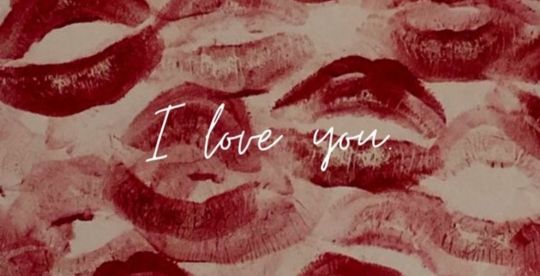

Summary: Emotions are hard, but feelings for Benjamin, the boy she never thought she'd even like, are harder. What's easier, though not by much, is writing poetry. After all, isn't love the perfect muse?
A/N: This is for my friends birthday! Happy birth bestie!! Also thank you to @mouseinthegreenhouse for betaing, though they spent most of it making fun of Menodora. Keep in mind this is not canon to the Daycycle universe. This is just a ship fic. Enjoy! My masterlist is here
"I know what you want from me, Benjamin. It’s a horrible idea," Menodora says as Benjamin walks her to her door. She hangs in the doorway, watching only her breath turn to mist.
"Okay."
"Seriously.” She scrambles for something to say. She can’t think of anything else.
"Okay, Menodora." He sounds somewhere between tired and amused. "Goodnight."
"Goodnight," she says. She shuts her door, ignoring how warm her cheeks feel.
--
My body crescendos, she wrote once. It's barely a line, not really poetry, but she tries to shove all the emotion she has into it. She fails.
There's hundreds more like this. Fragments of deep emotion. Talentless scarps of attempts to grow closer to the single truth.
If you were my disaster, another reads, I'd die directly in your arms. But you are my lighthouse so I love you like letting my ship take harbor before putting it out to sea.
She could just write I love you. It'd be so much more symbolic. It still wouldn't put to words the shame she feels.
--
She runs into him three days later in the rain. He laughs at her as she holds her book bag over her head before extending his umbrella to her.
"Sometimes I forget how much you hate the rain."
"I'll never understand why people like it," Menodora huffs. She leans closer so he too gets covered by the umbrella, ignoring how close this makes them.
"Not everyone has lightning in their veins, presumably." He turns a bit to look at her from the corner of his eye. "Have you eaten?"
"Oh— No. I had to get to class."
He takes his free hand and grabs one of Menodora's. "Come on, I'll take you to my favorite place. They have meat buns there."
It takes all of her willpower to not make her heart pound. A no is on the tip of her tongue, but then her heart leaps out of her hands; Benjamin smiles.
"As long as you eat too," is all she says instead. He grabs one of her arms without hesitance. She counts it as a win.
When they get to the cafe she orders a black coffee. He scrunches his nose. "Sugar doesn’t kill, you know that?”
“It can actually,” Menodora says, sipping her perfectly normal coffee. They sit down. “It’s not my fault one of us would drink sugar if they could.”
“That’s a very common thing.”
“And it’s unhealthy. And gross.”
Benjamin puts both arms on the table. “You just hate sweet things. You’re so…”
“Bitter?”
“Savory.” He mixes his coffee. “Not bitter.”
“Same thing.” Benjamin huffs. Menodora looks out the window. He’s wearing that hoodie she likes.
Focus. She can write bad unfinished poetry about this later.
She takes out her laptop and they study. Benjamin tells her about all the history he’s learning about. He makes Menodora laugh with horrible jokes, and she makes fun of his professor. She tells him about the music history of things around the same time, and she swears he hangs off her every word.
She finds herself wondering what his coffee tastes like during one of his rants about the typos in his study material. But it���s all gone. Menodora wonders if it’s still on his lips.
--
"What do you think blood is?" she asks. They lay on the cool back of his car.
"Like literally or?"
"Metaphorically of course. Non physically at the very least."
"Those are two different things."
Menodora shakes her head. "No, no. It's like, most people say blood is life—life energy, light force—but I don't believe that."
Benjamin turns to her. "What do you believe then?"
This curiosity is so faerie-like that she reminds herself of the hate she feels for anyone who doesn't consider him to be the fae. What vampire would humor her but him, a half fae? What vampire would love her so to withstand her constant fluctuations from adoration to maliciousness?
"Blood is the soul. Which sounds the same, but it's not. Life is existence, the plants the trees, but your soul is you. Maybe drinking someone's blood means understanding them past any way words could describe."
"You're good at that. Writing poetry out of nowhere."
"I could have read it somewhere," she defends. She feels the need to shift her head closer to his.
"But you didn't. It came from you. It came from your personal experiences."
If only he knew how true that was. "What constellations do you want to see tonight?"
"I don't care. As long as I'm with you it's fun." He looks back at the sky. Menodora is thankful. She doesn't know what she'd do if he was still looking at her. "And I don't know if I agree with your idea."
"Really? What do you think?" He's more knowledgeable on the subject anyway. Menodora's thoughts on the matter are scraps of requests that live and die on her tongue when she sees him.
"It makes the whole blood drinking thing sound pretty. It isn't. It's ugly and raw and, well, awful."
His face is so sour. He speaks as if he's some werewolf, ranting about vampires. He speaks as if he isn't one himself, as if human blood does not run in his stomach at this moment.
Human blood that is not Menodora's. Such a stupid thing to be envious of.
"Hard to know which one of us is more right. Historically one of us is the bitter and the bitten, but you know what blood tastes like more than I do. Still, I do think it's pretty. Like childbirth is beautiful without being beautiful. It's messy and miserable, but it's life."
Benjamin laughs. It makes the cool night air taste bitter on Menodora's tongue. "I wish I thought like that. How do you find it within yourself to find it pretty? Doesn't it, I don't know, scare you?"
Don't I scare you? The question hangs in the air, and Menodora shakes her head to dispel it. "No, it doesn't."
--
Scary how? She writes on a napkin as soon as she gets home. Your arms have never crushed me.
She groans into her hands when she can not think of another line. She repeats it out loud time and time again, but there's nothing to add. It's not perfect. Menodora knows it needs something to really drive the punch of phonetics in.
She has no more words to say. She realizes now that the words are more like a diary entry than a poem. It's fact, not poetry.
She goes back to some of her old lines in frustration. If she can not write something new, she can finish something old, surely. She spends hours at her desk over the next couple of days. She crumbles paper after paper, dashes word after word. She pokes her emotion like a bear for inspiration. She bargains with creativity.
She ends up with this:
My body crescendos
I crash crushed by the waves
I'd carve your name into the skin above my heart
I'd halt the heavens so they could hear you
I'd do all this, all this, but I wouldn't say I love you
It turns out that the real poetry is still a fact, this one Menodora had been hoping was fiction.
--
Menodora presses her face into Bonnie’s couch and screams. “I’m a horrible person.”
“No, you’re not.” Bonnie rubs her back. “Why do you think so?”
“Because. Ben likes me—thinks he likes me. But he doesn’t because he doesn't know how”—she makes a noise—”I am. So he thinks he likes me.”
“Insecure?” Menodora lifts her face enough to glare at Bonnie. “I’m sorry, it’s true. I’ve never seen someone do more mental gymnastics to convince themselves someone didn’t like them.”
“But he’s so pretty.”
“You are too?”
“And kind, and funny.”
“Again, describing yourself.”
Menodora shakes her head. She lifts herself up completely. She puts a hand on each of Bonnie’s shoulders. “I’m not, though. I am not kind. I’m disarming, not funny. I’m so me.”
“And he likes you, for all of that. He isn’t blind. He knows you almost got him expelled.”
Menodora gags. “Don’t remind me. That— I want to say that was a lapse in judgment, but honestly it was pretty in character.”
“Yeah, it was. And that’s why he likes you. Because you are kind, funny, clever, disarming, pretty, and miserable to the bone.”
Menodora takes a bite of her previously discarded food. She can’t believe she let Bonnie get into her head. She promised that this movie night would be an opportunity to stop thinking about Benjamin, but here she is thinking about his name over and over.
“He deserves someone better,” Menodora says, still chewing. Bonnie sighs. “I’m serious! A normal girl would have told him that she didn’t like him by now, but here I am studying with him and eating the food he bought me. Oh my God, I’m leading him on. Oh my God.” She faceplants back into the couch. “I’m a horrible friend.”
Bonnie puts Menodora’s head in her lap. She pats Menodora’s forehead. “You’re not friends. Well, you are, but be honest you guys have been half dating for months. Would it really hurt just to stop running away from your feelings?”
Menodora hugs Bonnie’s knees. “I don’t know. What if he doesn’t get it though? What if he thinks loving me will be easy and backs down when he realizes I am so haphazardly broken?”
“Menodora,” Bonnie says, as if Menodora’s name has powers, “no one is easy to love. Benjamin isn’t even easy to love. He’s reckless, careless, and a little emotionally insensitive.”
Menodora turns onto her back. “But he doesn’t mean to be, and he always apologizes, even if he can't.”
“Yes, but you never have to accept those sorries, but you do, because you love him. He’d accept a thousand of your apologies, Meno. He’d accept you.”
--
Emilio accidentally sees some of her poetry when it leaks out of her bag. The look of pure disgust is enough to make her laugh.
“You need help. From a higher power. All of them at once,” he signs.
“You don’t even know what the poem is about,” she signs back.
“Mute. I am not blind, I’m mute. One day that is going to get into your thick skull. I see the way you look at Benjamin. A pair, you two. Disgustingly odd and weird and crooked. I’m almost surprised you two aren’t dating.”
“You and everyone else,” she sighs. “I’m starting to wonder a bit myself.”
Emilio makes a face. “I do not want to know. Talk to Bonnie about this, if you must.”
Menodora gathers her papers. “Well obviously we don’t need to continue our lesson today if you know enough signs to insult me. You’re getting really good, by the way.”
Emilio smiles a bit. “Thanks. Though I will say, while I have… thoughts about Benjamin, he’d be good for you.”
From Emilio that’s as good as the Luna’s word documented in gold. It’d be foolish not to at least consider his words. Menodora has never considered herself a fool.
--
“Why do you like poetry?” Benjamin asked her once, months ago.
“I don’t know.” She bit into her bread, looking off for an answer. “As pretentious as it is, poetry feels like breathing to me. It’s something I do because I must. I enjoy it because it fuels me.”
“Many would consider poetry pretentious.”
“I resent that. Poetry is often just emotion put to words in its rawest form. Is emotion pretentious?”
Benjamin thought for a moment. “Depends. Entitlement is pretty pretentious.”
“That isn’t relevant to the current topic,” Menodora huffed. “I agree, but every poem is not entitled. It’s withdrawn, if anything. Poetry is all the things you wish you could say but you don’t.”
“What do you write about, then?”
This question rings in her head as she looks at her newest poem.
If you were a disaster, I'd die directly in your arms
But you are my lighthouse in a lighting storm
My love in a lawless land
I'd dock my boat near you without hesitance
And I'd leave your harbors with resistance
Darkness they deem you, but dare I call them wrong
There's so much light within you, my little hailstorm
Menodora hates this poem. She can’t tell if it’s because it’s bad, or if the weight of the things she keeps not saying is starting to weigh her down. Even if she is right in her thinking, is she right in her execution?
--
Menodora runs into Benjamin on his exam day. He’s a flurry of rants, even though he got a good grade. Menodora almost feels bad for her professor, and then she remembers that he docked twenty point from one of Benjamin’s essays because he felt it could be better. He deserves every true complaint that falls from Benjamin’s mouth.
At the end of his rant, Benjamin turns to Menodora. “Want to go out in, say, a week? I have to take my sister to this concert she’s excited about, but afterwards I’m free.”
Menodora ducks bread into her coffee. “Sure. Where do you want to go? I heard that there was a good movie in theaters.”
“One of your movies or mine?”
“Yours.”
Benjamin scrunches his nose. “So you can look like half on death’s door trying to keep in your criticisms?”
Menodora just doesn’t think that being shot in the leg is something you can walk off, and that media should stop presenting it as such so Emilio doesn’t have to deal with more dumbasses in his office, but to each their own. “I like going with you.”
Benjamin raises an eyebrow. “Is that a confession, my dear?” Menodora takes a sip of her coffee. “I’m joking.”
“I know. I didn’t say no.” There’s soggy bread crumbles in her mouth. How unromantic. “Take it as an invitation. I’d ask you out, but that’d be ruining your chance, no?”
She makes eye contact with him at her last word, and instantly regrets it. Benjamin looks so shocked. You’d think she told him he won the lottery or something.
“I can’t tell if you’re joking.” He pauses, and if he could, Menodora thinks he’d take a deep breath. “It’d be a very unfunny one.”
“No, that’d be cruel. I’m being honest.”
“You want to go out?”
“Yes.”
“On a date?”
“Yes.”
Benjamin narrows his eyes. “What happened to your whole reservations?”
“Maybe I realized I can’t make choices for other people, or that it isn’t even a choice I’d want to make for you. Also maybe I’m bad at being emotionally coherent.”
“But you like me?”
“I’m starting to regret this.”
“Come on! At least give me this.”
“Yes, I like you. I have for months. Admittingly I’m starting to think instead of letting you take me out I should apologize and forget this interaction existed.”
“Do not.”
“Ah, constraints.” She smiles. “I won’t.”
He waves a hand. “If you had told me that you didn’t like me, I would have stopped chasing you. Simple as that. But I knew that wasn’t exactly the truth, and I figured you would eventually cough up your reasoning. You never did though.”
“Must you shake the entire truth out of me?”
“Physically, no. Emotionally, yes. You’re a very confusing lady. Pretty, but still.”
“It just sounds silly to me. I am very unsure why you’d want to pursue a relationship with me. I’m not exactly nice, or darling. It’d be difficult to go to family gatherings. Kronos would probably hate anyone I hate, so that’s fine, but your parents like you. I like your parents. It’s embarrassing, I’d think.”
He blinks. “That’s… it?” He closes his eyes. “I understand your claims are serious and whatnot, but I thought you didn’t like me, or thought that dating someone like me would be too taxing.”
“Why would I care?”
“Better question: why would I?” He laughs. “You’re so interesting. You crushed me in debate months ago, but now you sit before me and tell me that you have nothing of value to offer. You’re wrong about that, by the way. You are very darling, and nice, when you allow yourself to be.”
“Which isn’t always.”
“Does it have to be? It’s enough for me.”
“We’re teenagers now, but what about later? It’s not like there’s many ways I could become immortal. It’s a coupling made for heartbreak.”
“That is a better reasoning.” He takes a sip of his coffee and pulls a face of disgust when it’s most likely cold. “I might be immortal, but I am still young. It will be a very long time before that means anything to me.” He rests his head in one of his hands. “Besides, I don’t think I could love anyone else.”
“It’s too soon to say.”
“No, it’s not. It’s not something I can explain to you that you would understand. Our elements are so different, and we aren’t the species, but this is something I just know. We were made for each other, not just here and now, but in the next a thousand years, in every universe.”
“Oh my God,” she groans. Menodora is not going to blush at that. “Are we going out or not?”
“Of course, darling. Though not the movies, what mild soul do you think I am?”
“Truly my mistake,” Menodora deadpans.
“Yes, yes.” He puts a finger to his chin. “Dinner? Somewhere fancy?”
“Okay.”
“I’ll pick you up—and pay. Don’t even try it.”
She rolls her eyes. “I wasn’t going to try to.”
His eyes soften. “You really are enough for me, you know that?”
“I think I’m starting to.” His phone buzzes. “Ah, right. You have a study group soon.”
“Actually I’m late for it.” He gets up. “We’ll talk later?”
“Sure.”
“Okay. Goodbye."
"Goodbye, Menodora."
--
Two weeks later they go to the movies like she wanted. Afterwards they sit in his car. He's completely leaned over to her side of the car, pressing kisses all over her face. She laughs, but he tells her it's quite serious.
"It's not everyday you get to kiss a pretty girl, you know. That's why you truly must savor the moment."
He drives her home and insists on pulling straight up to her house. When Kronos asks how her evening was with that boy, she feels less uncomfortable.
"Well, sir, I am dating that boy," she says. The look of disgust on Kronos's face is enough to make her giddy.
--
"You never show me any of your poetry," Benjamin whines one day, face planting into the crook of her neck.
Menodora side eyes him. "You're reading it now, certainly."
"It's the principle of the thing. My girlfriend, the most beautiful woman I've ever met, won't even let me read the thing she's passionate about. Maybe I have failed as a boyfriend because—"
Menodora isn't listening to that entire paragraph. "I didn't let you read them because they were about you."
Benjamin straightens up. "Really? Can I read one now?"
"They're not good. The word choice is awful. The things I was trying to express were cringey." None of her words are making him look less excited. "Fine, but if you start going on and on about how great you are afterwards I'm kicking you out."
She opens her draw and pulls out her poetry scraps. "I didn't finish a lot of it. You're hard to write about."
Benjamin takes the stack from her and pulls up a chair. She stops writing to watch him read. Curse him and his stupid vampire genes because his face is so blank as he reads it. He isn't doing it on purpose so she can't even complain about it. Menodora huffs.
She sees one of the full poems and she's immediately mortified. "Nevermind give it back."
"These are beautiful," he says, voice so full of wonder. "I love these. You're an incredible poet."
Menodora grabs at her poems. He lets her take them. "I appreciate it, but it's nothing, really. They are just stray thoughts about how I was feeling."
Benjamin's awe only grows. "Do you mean to say that your actual thoughts are just as pretty as that?"
"I will kill you."
Benjamin kisses her cheek. "I'd let you, sweetheart. It's a little bonding exercise."
She ignores the validity of the statement. "It's weird having you read those. I never thought you'd see them."
"There's no part of you that scares me. Besides, it's very flattering."
"What did I say about the ego thing?" Menodora warns, but the look in Benjamin's eyes keeps her from bantering further.
"I love you," he says simply, but it's for the first time.
"I love you too," she replies, warmer than she's been before.
#project daycycle#my bloody masterpieces#p. d: menodora#p. d: benjamin#mbm: Pretentious Poetry#my writing#vampire x human#original story#original writing#original characters
14 notes
·
View notes
Note
"Because the only thing human Griffith did that hurt Guts was sacrifice the Band - and Guts never seemed to really blame him for that anyway." What you've said here is directly contradicted in black Swordsman. He blames Griffith for branding him and by extension the hawks. He says "Thanks to me, who's fighting an army of the dead because of you...!!!" He blames him for his circumstances because he branded him and it wasn't femto who did that, it was Griffith.
reference is to this post
Yeah I've actually gotten into this in other posts a little. The Black Swordsman arc portrays Guts' feelings as a betrayal paralleled directly to his father selling him to Donovan, sans fridged girlfriend. Guts is messed up over it because it's a symbolic replay of his childhood trauma. He absolutely blames Griffith in the Black Swordsman arc, because the only thing that fucked him up in the Black Swordsman arc was being sacrificed (as it should've been). But then that's virtually retconned away.
During the actual Eclipse Guts isn't angry at Griffith/Femto until Femto rapes Casca. He looks sad when Griffith sacrifices him, he spends a few minutes ignoring the Hawks getting eaten to try to cut Griffith out of whatever he's incubating in with his dagger, he sends a wistful look back at him when he finally acknowledges the sacrifice and gives up to fight monsters. He expresses rage at the monsters eating the Hawks, but not at Griffith, until the rape scene.
During the Hill of Swords confrontation there's one mention of "all those you betrayed," which suggests anger over the sacrifice, but it's a minor note compared to the fact that every single time post-Eclipse Guts thinks about Griffith it's with sadness and regret. If he's feeling rage, he thinks about Femto. If he's thinking about Griffith, it's Griffith kneeling in the snow after the second duel signifying Guts' regret, or it's Griffith facing away from him looking noble, Griffith glancing back at him on a battlefield which makes Guts cry, Griffith as a warm light in his memories, Griffith as part of the campfire from those days that still burns in his chest, etc.
Most directly, when he sees NGriff for the first time he forgets his urge to kill because it's like Griffith has been stolen from the past, the way he used to be. Plus he tells Rickert "that's not the Griffith you know anymore." He differentiates between Griffith and Femto/NGriff, and being reminded of human Griffith makes him forget his rage, so yeah, not a lot of anger aimed at that version of him, even if that's the same guy who sacrificed Guts to monsters.
I have a list of illustrations from the manga actually, of the way Guts thinks about Griffith post-Eclipse, if you want the visuals and the citations, plus the one post-Eclipse exception I could think of lol.
I do wanna add though that it does track with Guts never hating Gambino either and feeling regret towards him, so while I think the themes were tighter in the Black Swordsman arc, Guts' mixed feelings and love + regret towards Griffith fit his character perfectly.
So I did exaggerate a bit with that line, but I stand by the sentiment. Imo Guts' anger at Griffith is one of those aspects of the Black Swordsman arc that shifted around and evolved as Miura actually wrote the story and came up with things like the Eclipse rape and maybe Guts' own regrets over leaving, the intense homoeroticism, etc lol.
18 notes
·
View notes
Text

@dragonflytehanu thanks for the ask <3
Tell us about your Tav! Name, class and subclass, race, pronouns. Do you have a headcanon for where they're from? Their family? Are they a Dark Urge? Or did you choose an Origin Character? Was it an easy decision?
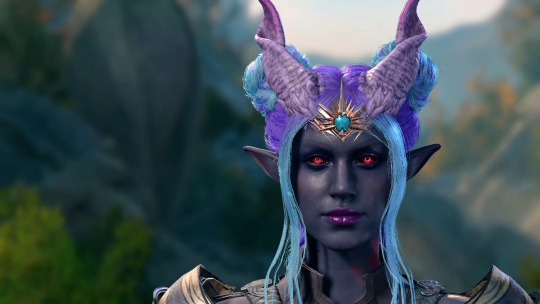

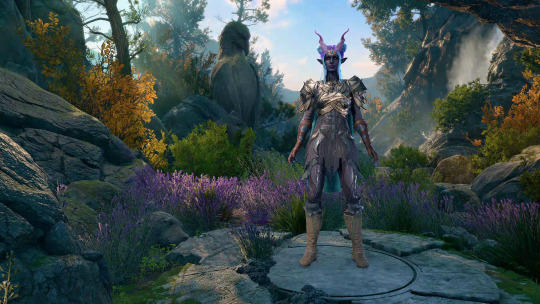
I already wrote a bit about Akachi here. To add: despite her being a Faithless (she doesn't hide it), people usually notice she always wear a necklace with the holy symbol of Eilistraee. The jewel was passed down to her from her mother Ardul'ylene (it was originally of her grandmother Esmerelle), when she decided to abandon her faith in the Dark Maiden: it has no religious meaning to Akachi. For her, it is simply a treasured memento of her family, a reminder that no matter where she is, her family is always with her.
Another fact about Akachi is that she is named after a Chosen of Myrkul. At first she wasn't happy when she learnt this; but she changed her mind after her parents narrated to her the story of the man, what he did and why (basically, they told her about the events of Neverwinter Nights 2: Mask of the Betrayer). She's proud of her name and a sure way to greatly anger her is to insult her for it.

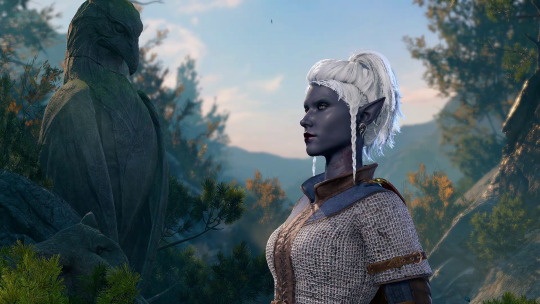
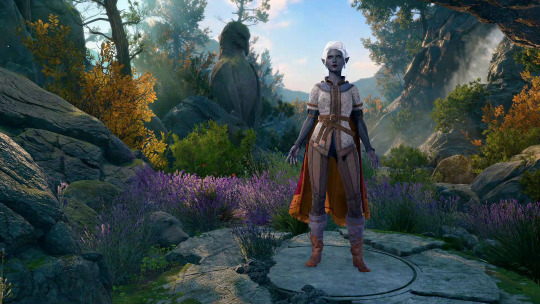
Kidis is my Dark Urge oc. She's a drow bard, playing her violin whenever she can because it temporarily soothes her growing unease about her violent urges. At first, she thought that her violent impulses & loss of memory were a symptom of ceremorphosis, but when it became clear that they aren't, she simply decide to ignore them, hoping (wrongly) that they will go away on their own. This is her usual way to deal with the issues she face. She also cares a great deal about her reputation, wanting to be unremarkable and forgettable as possible: the less people she has to interact with directly, the better.
3. Has your Character been using their illithid powers?
Akachi: only to rescue Shadowheart on the nautiloid and to read Astarion's mind when he tried to bite her. The latter event caused her to never use the powers for the rest of the game: she felt so awful after doing it because she violated someone else's mind and she loathes when it is done on her (and she will feel worse when she will learn about Astarion's past). She did it instinctively, thinking he was attacking her, but after Astarion left, she vowed to never doing it again and tried to apologize to him for it the next day.
Kidis: she is less careful about using them. She thinks that using them in order to avoid fights and to obtain useful information from enemies is acceptable.
24. Was your illithid tadpole empowered by anything in Act 1? If so, how does your Character feel about that?
No. Absolutely not. Neither Akachi nor Kidis use other tadpoles to empower their own. Why give more power to the source of your problems?
27. Who ended up in your Character's most used party?
Akachi: the main party for act 1 is Astarion/Karlach/Gale. Astarion is always in the party (initially because she doesn't trust him and wants to keep an eye on him, after she comes to enjoy his company), Gale is the one swapped out when I need another companion for their quest (only for gameplay reasons) and Karlach because she and Akachi get on well immediately (this won't last, though, because they will fall out in act 3 over how to deal with a certain npc).
Kidis: Astarion is always in the party as usual. There's also Lae'zel because Akachi didn't recruit her and I want to see her story. The last party member, for now, is Shadowheart.
#dragonflytehanu#asks#myasks#mybg3#myposts#bg3 oc: Akachi Farlong#bg3 oc: Kidis#bg3 act 1 asks#baldur's gate 3 spoilers#Kidis' answers are short because I'm in the druid grove in her playthrough so she is still in early development#and Akachi is a little more evil than planned#because she will wage war against the world for those she cares about#but she doesn't absolutely care about the fate of strangers and she can be rather callous towards them#although she performs good deeds (like helping the tieflings against the goblins)#it's because these benefit her or help her with her tadpole problem#this causes several arguments with Wyll seeing that she won't help strangers if there isn't any clear reward
7 notes
·
View notes
Text
Phil elvrum - by abigail comaholly
There is this certain threshold right. Where if you pay enough attention to life, during life,
There appears to be no end.
Like if you stand there and actually engage with the beauty of an ambegious (i suppose in phil elvrum case its often natural, but it can also be rustic, like the paint on a house) thing, like for example the water running down the face of the tree bark, you feel only a sense of presence but no sense of finite narrative, and thus no sense of narrative resolution, you can see where its going, but there appears to be no end. The only end would be a fabricated, arbitrary or logistic conclusion, like having to go home because your mum called you to, but theres always the sense that you could go back and continue an endless story.
If you focus on objectifications (Like for example, objects as having purposes, like the story of the fence ending in the outcome that it stops the things from inside it from getting out) it seems like life is finite and things end. Because the very way we create idea of death is by attributing things purposes and then saying there identity 'dies' when they become redundant in relation to said purposes. People conceptualize death by turning a person from a subject to an object, as both through claiming the person looses their subjectivity (since they are unable to have it derived from them anymore, as they appear to only follow the laws of physics from then on), and also by categorising them based on the 'redundancy' of their body (its inability to move, meaning that they cannot be part of the narrative of being alive). However one never categorises a dead person as 'more subjective than them', even though the person who has just died has expereinced an expereince of subjective intensity beyond what one could imagine, the impossibility it must have felt like to actually pass into death from the first perspective of being alive (not just the questions they would’ve been asking as they slowly crossfaded into death, but the actual movement into somewhere that isnt alive, or the dispersion of the feeling of being alive).
But when you long for something, when you say 'i dont know what this is', yet you still look at it, you are waiting for it, it is something that you expect will rather explain itself to you, rather than you explain it on behalf of itself.
I do think people's lives end on this earth, like their body, their ghost falls out and they cant fit back in.
But if, during this life, you have a kind of patience where you expect something to happen.
Like you dont assert what is going on, but you just wait for it
You expect something to be worth it and to come, then
There is no end.
It just feels like waiting forever in each moment. Each moment feels infinitely long
As we wait. And sometimes it comes, a friend, a wonderful friend, a wonderful and singular raindrop hits you straight in the eye as you look at clouds. But surely these events dont take place on earth, they are too succinct and connected to me and brilliant, they responded too directly to my desire for them. After i experience those moments i think of it in a way where it felt like i was asleep for a bit and then when the moment was over woke up again and then life went back to feeling like it takes forever again. Because i guess when nothing is conclusive than nothing can help conclude that feeling.
Afterward: Sorry i just wrote this thing on my mums computer while listening to to The Microphones on my mums and i thought it was really good and Annabel and Sebastian said i was allowed to use this account whenever i wanted to say something so long as i told everyone that it was me who did so um yeah.
Abigail Comaholly, 14 years old, Snowflake Symbol, Dissappearing Like the Dirt on the Roads or a Gopher up a Drain Pipe when the big Rains hit Street. (It's the one with the white painted wooden planks where the paint is mostly falling off and/or has lichen on it and all the trees without leaves around the front bedroom (which is my bedroom)) <3
Hiii, also, 8th of January 2004 2:47pm
2 notes
·
View notes